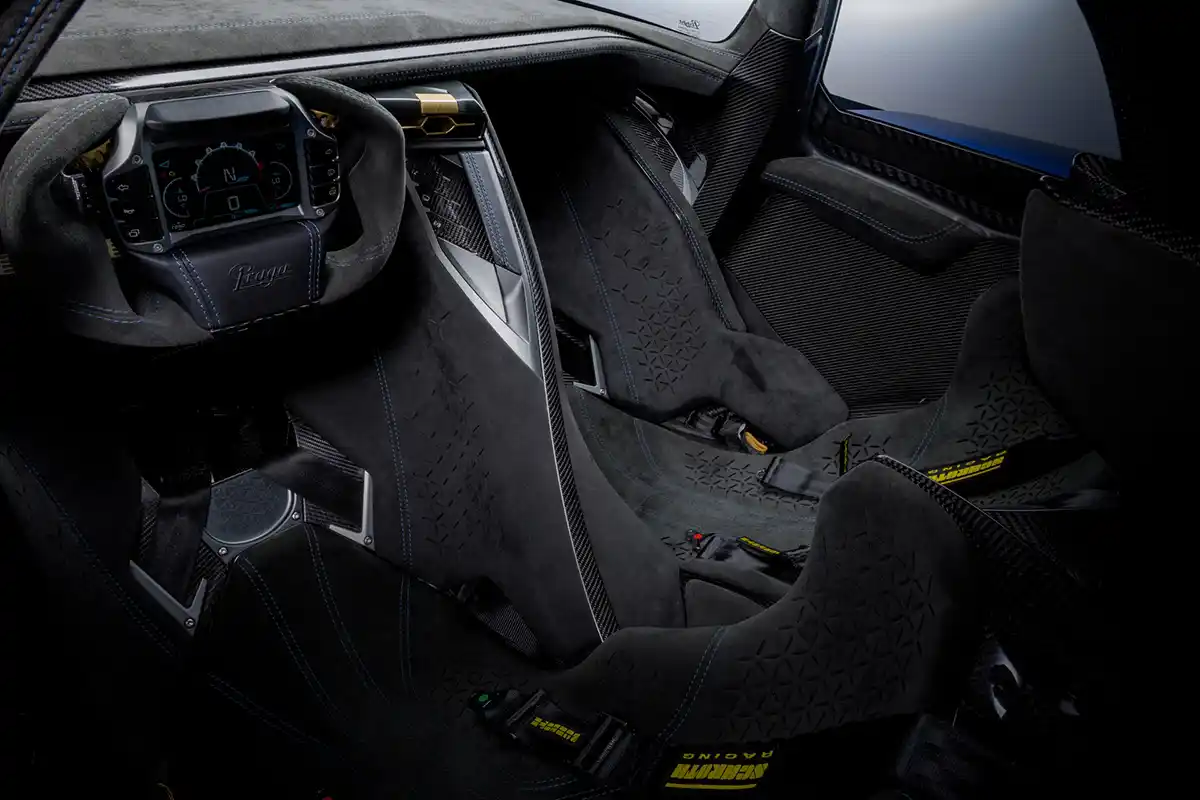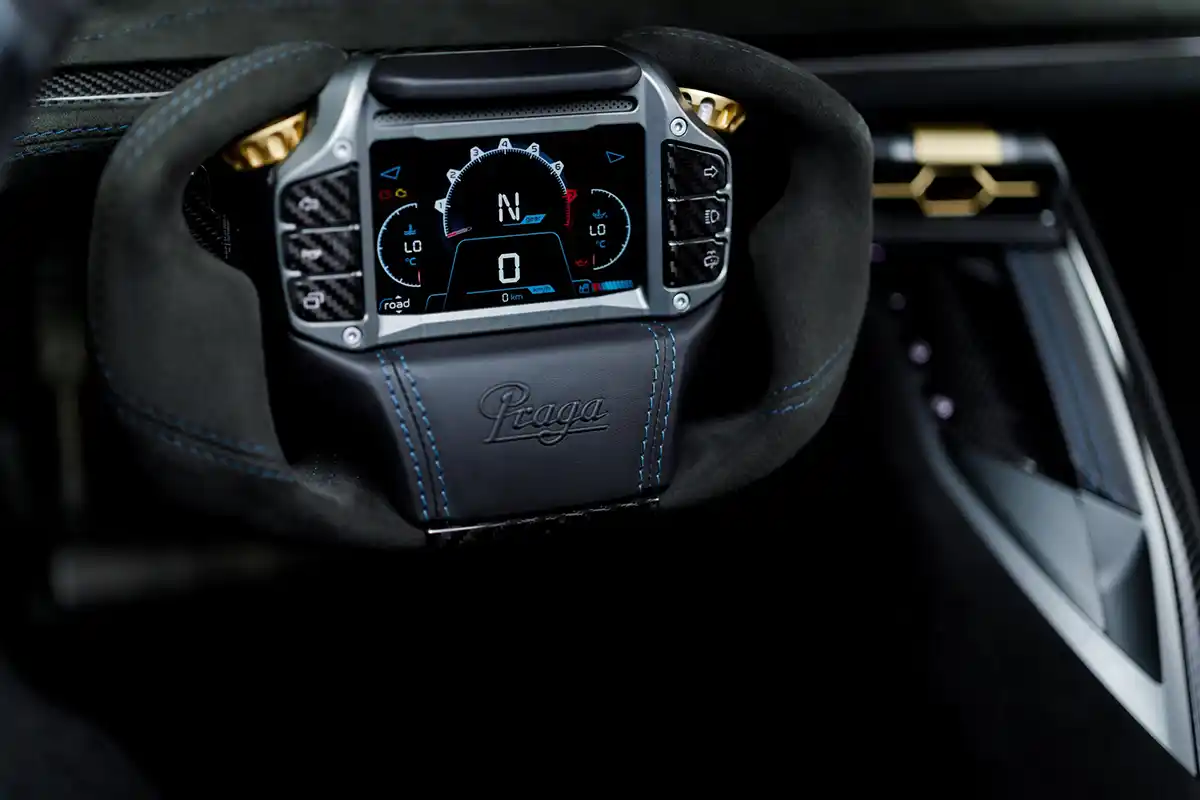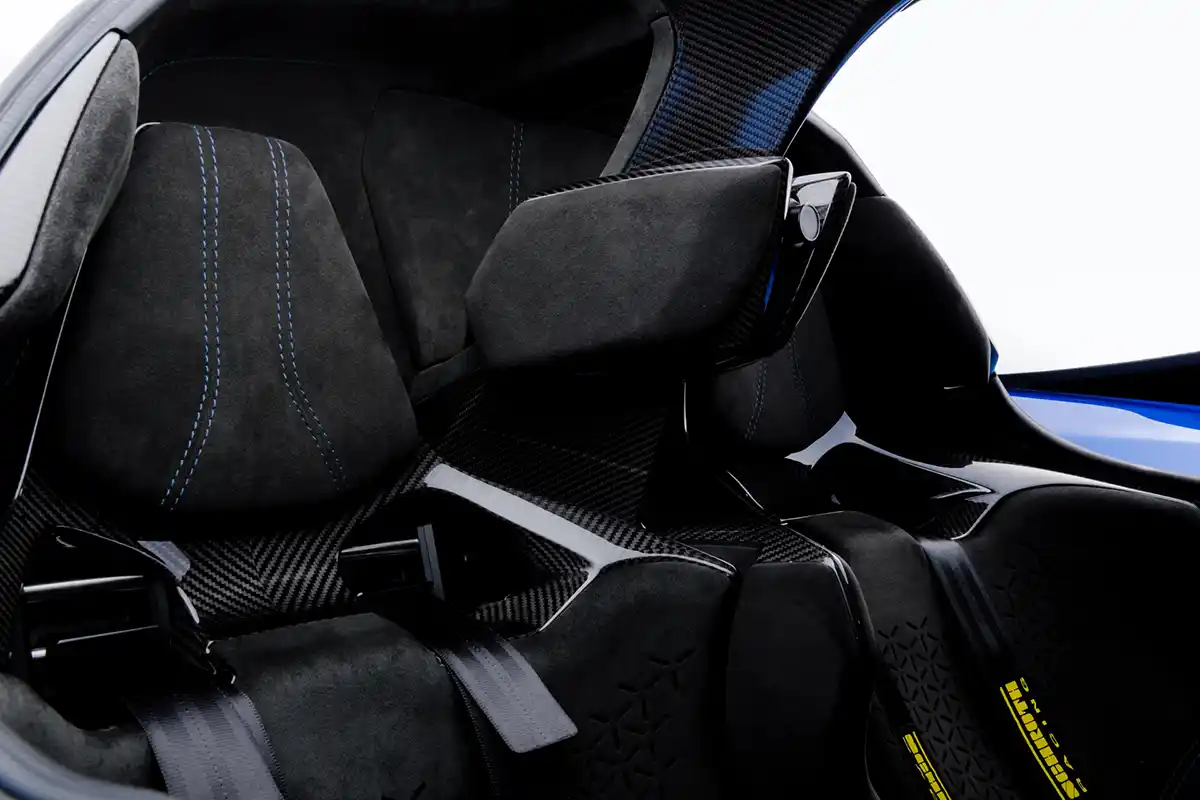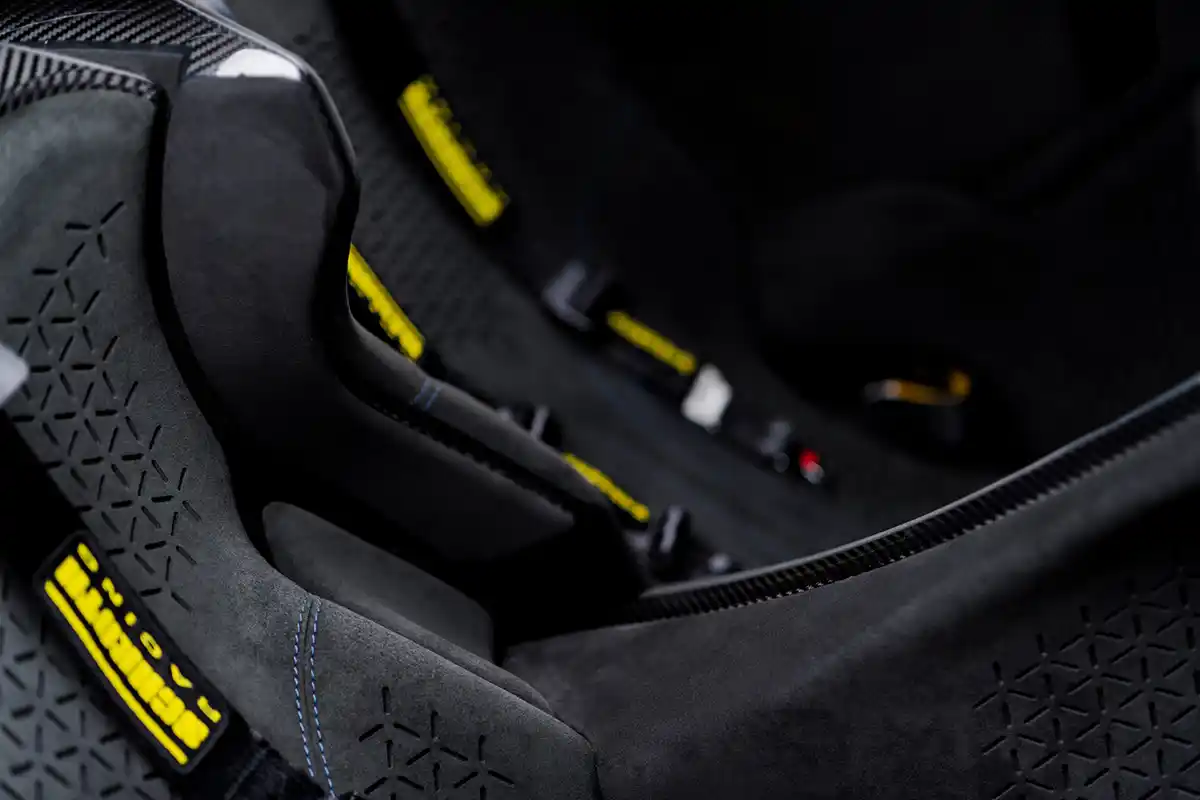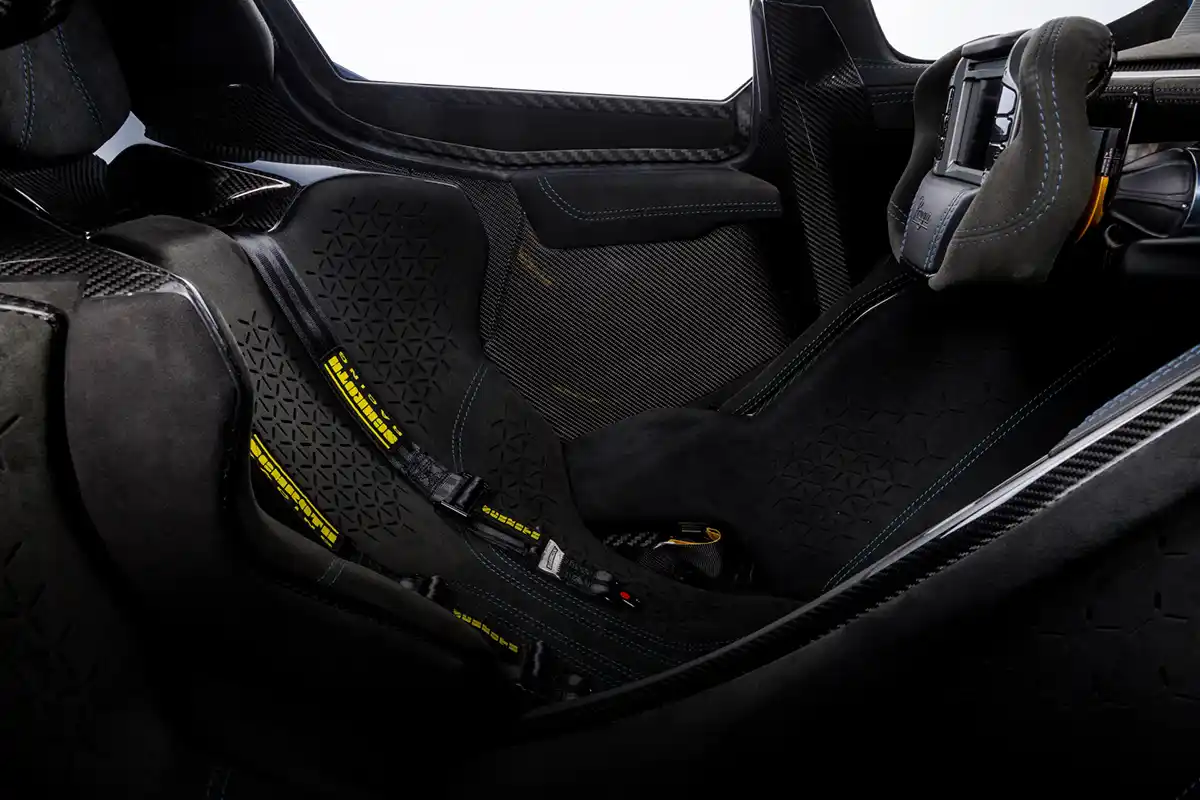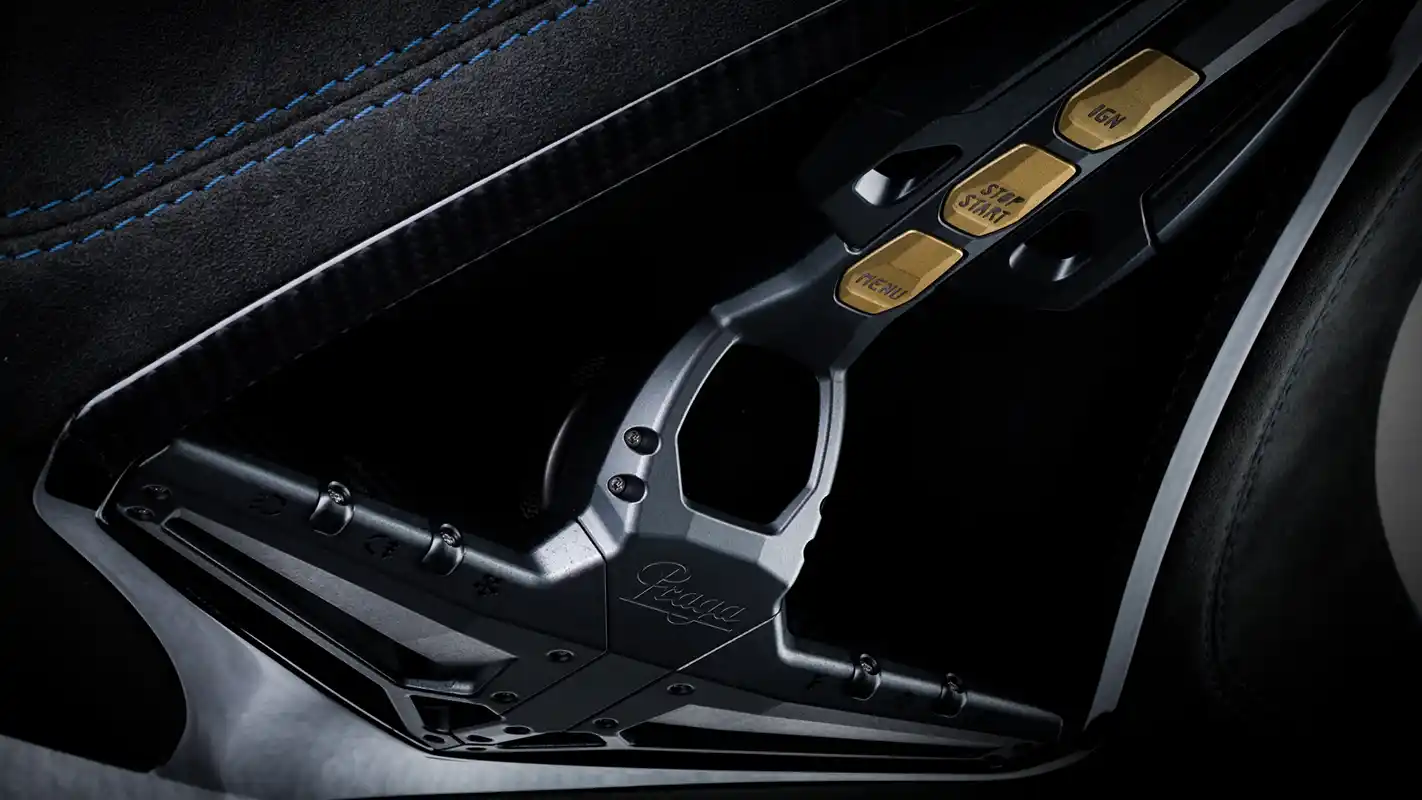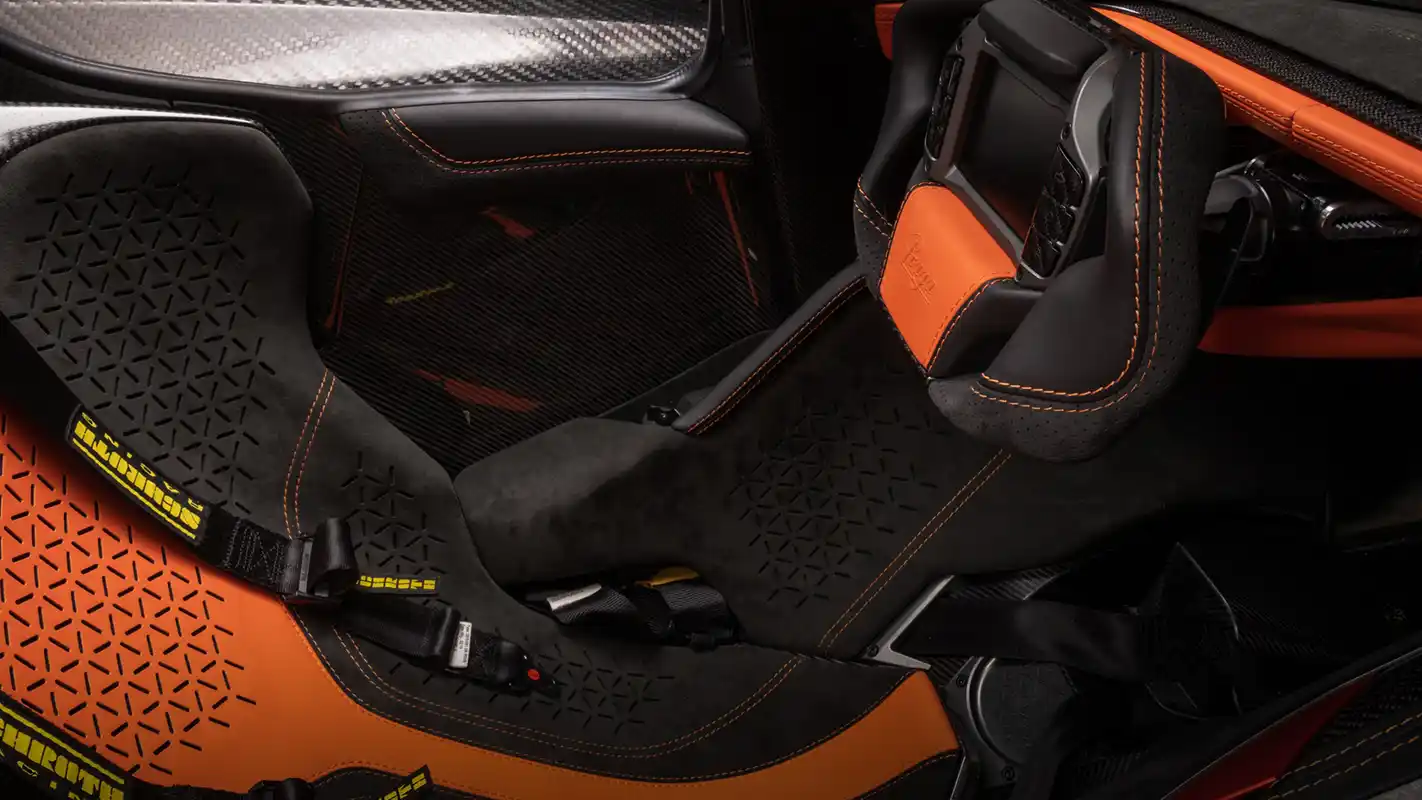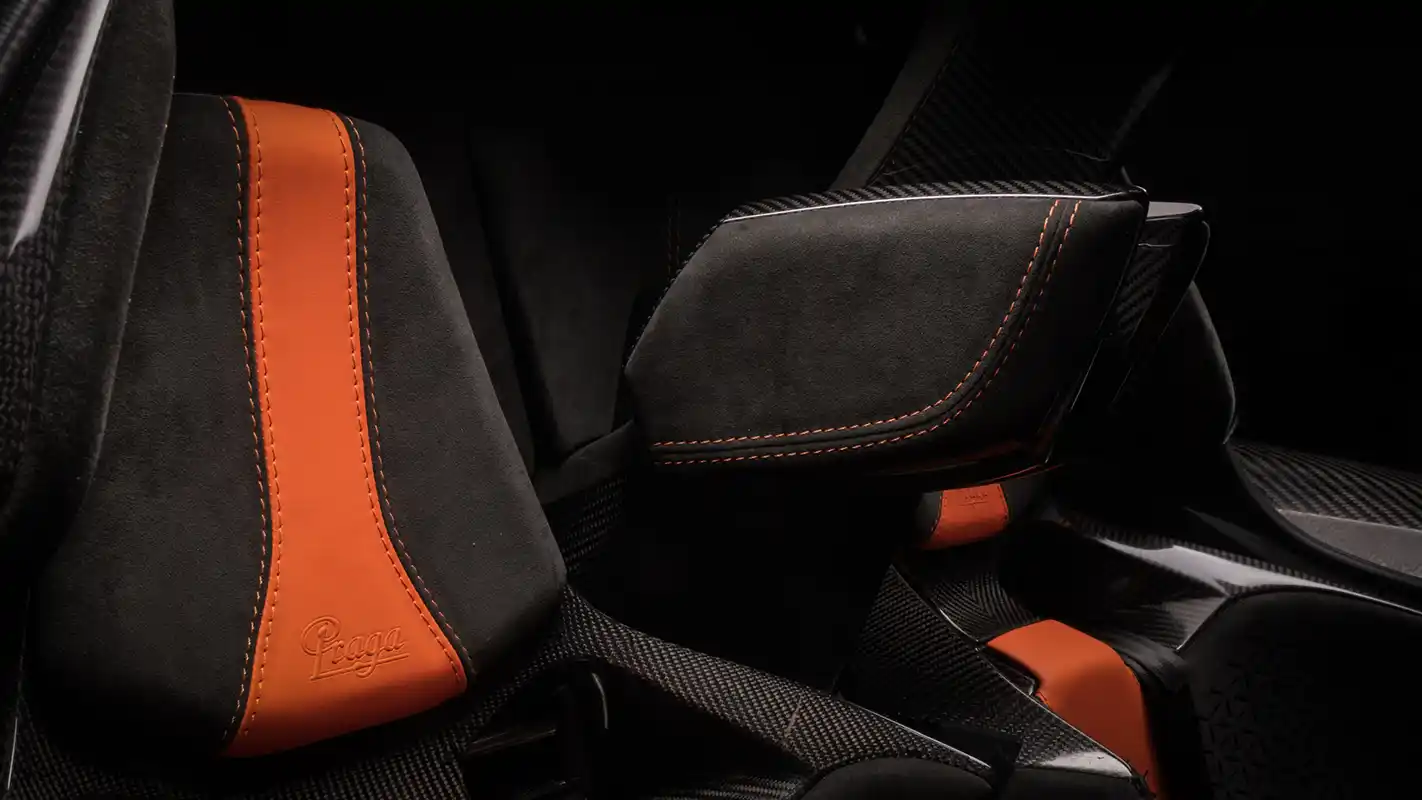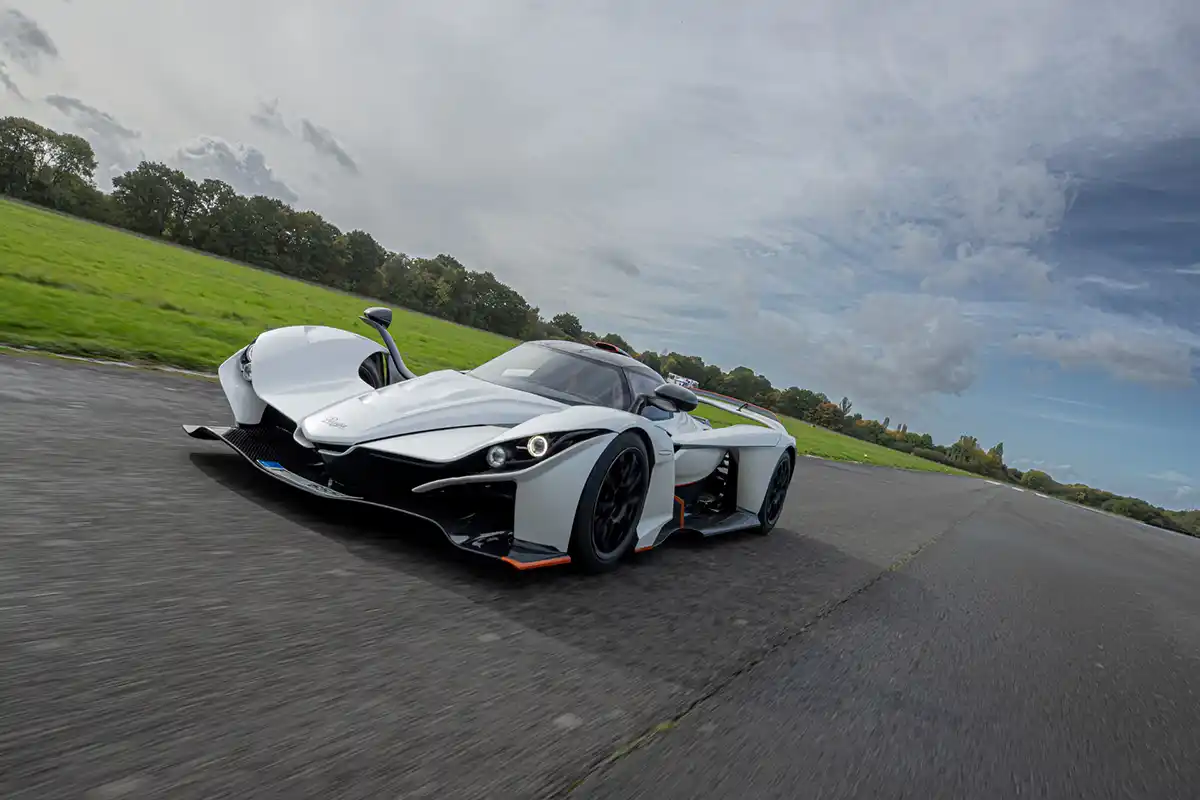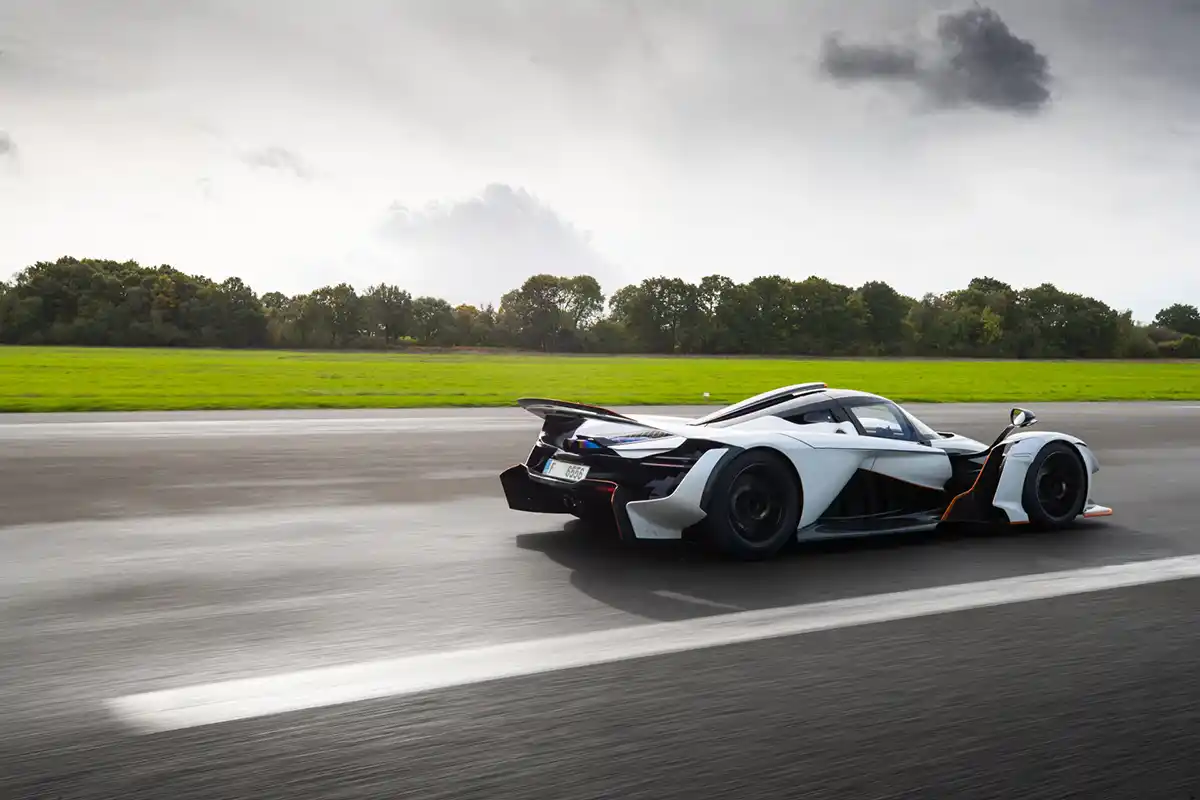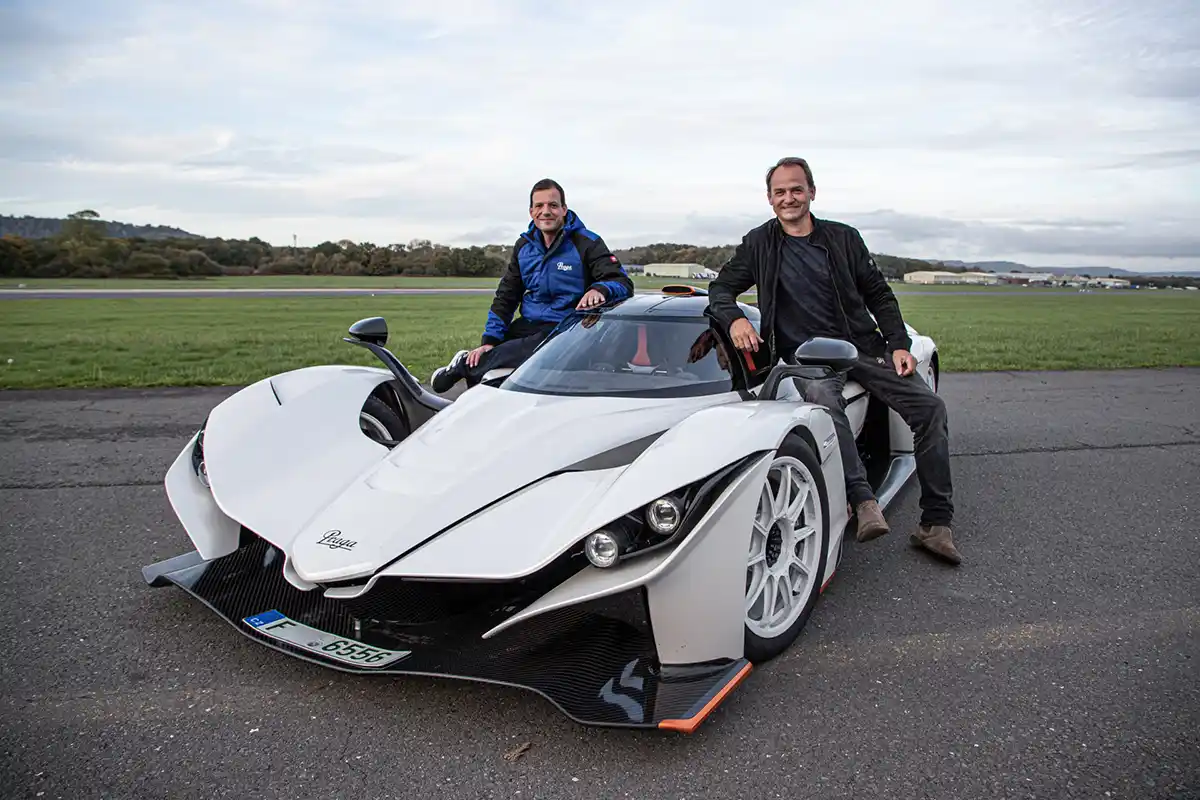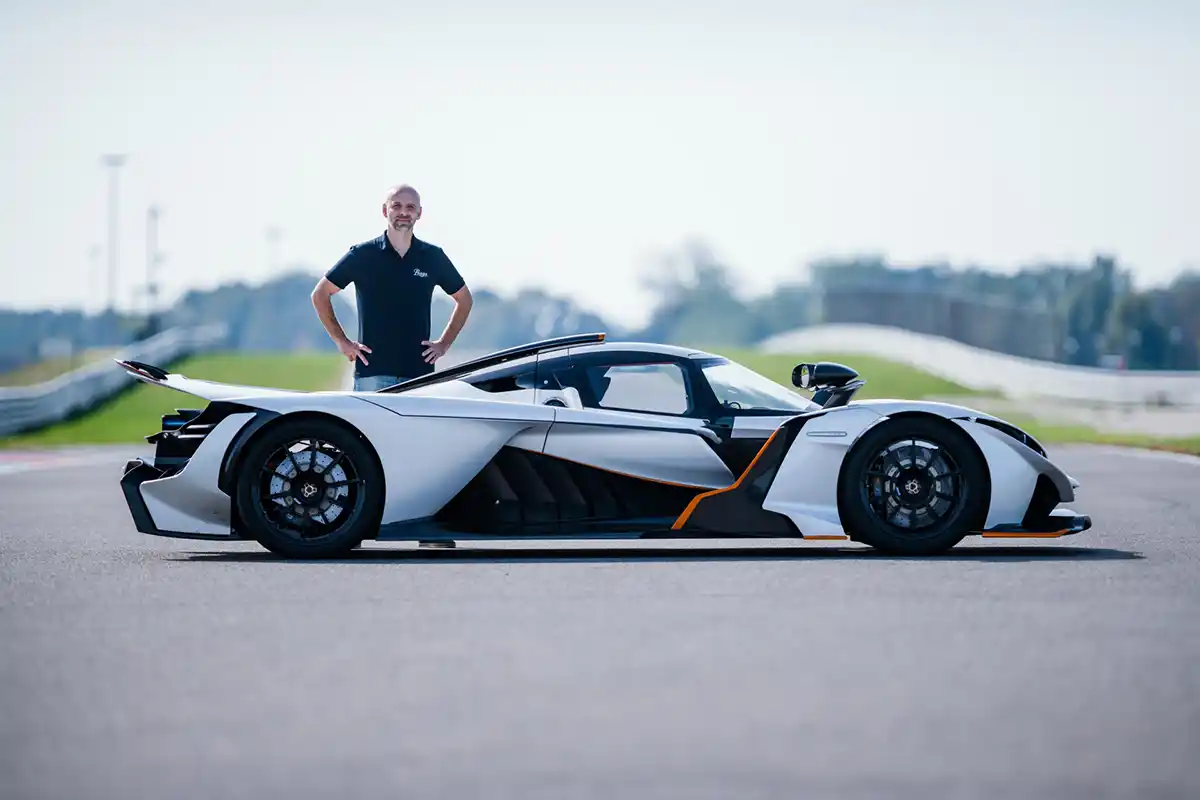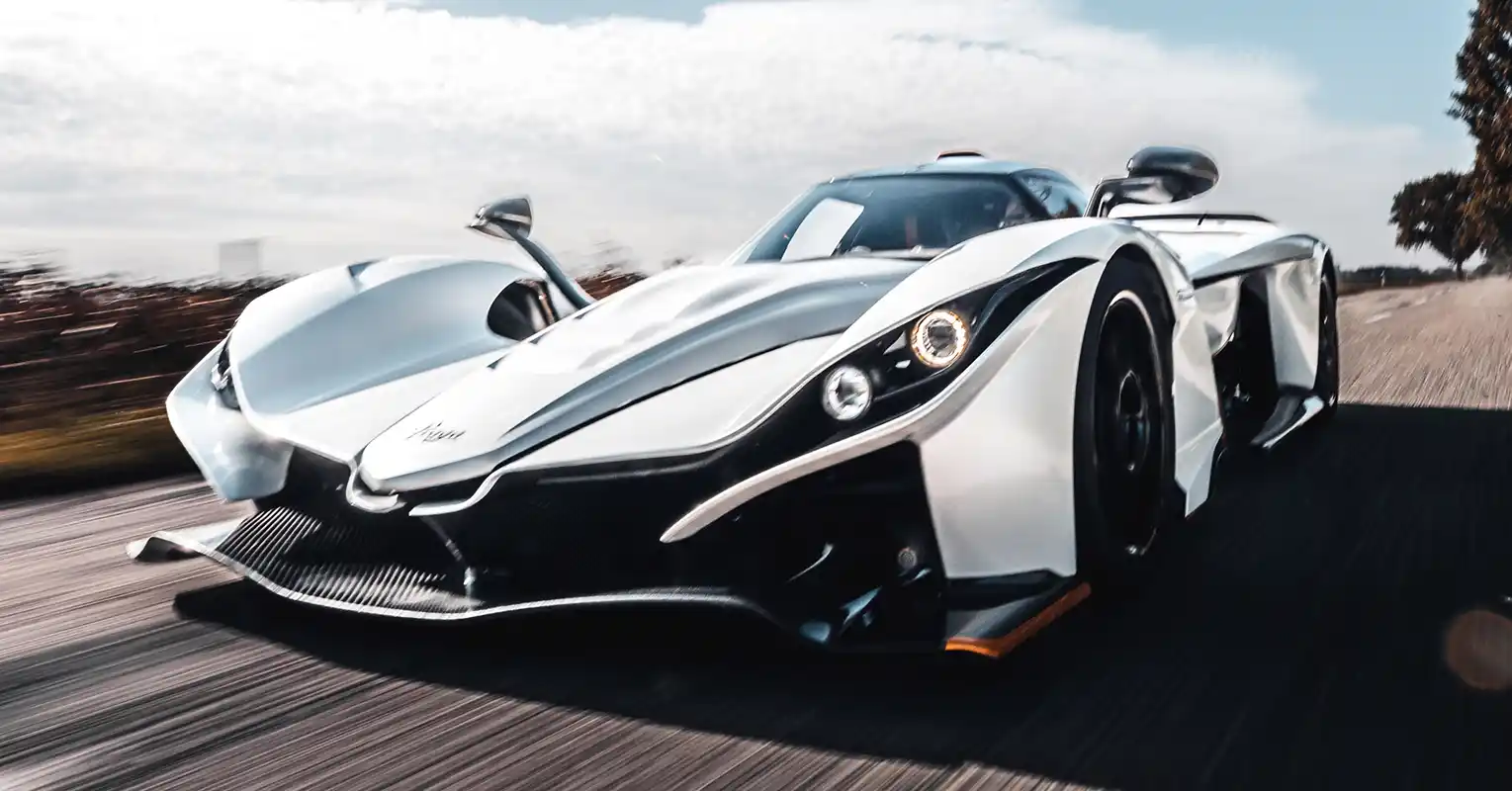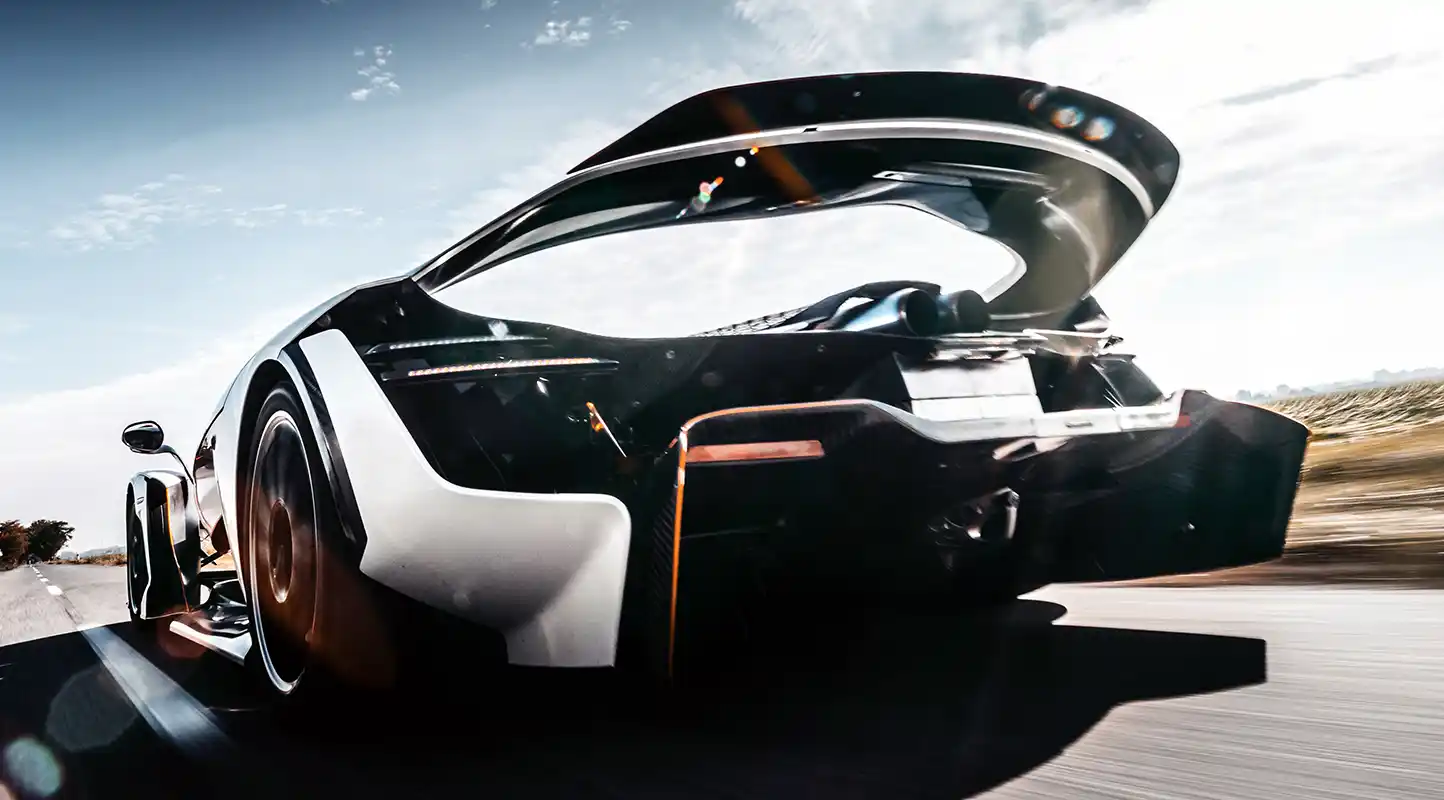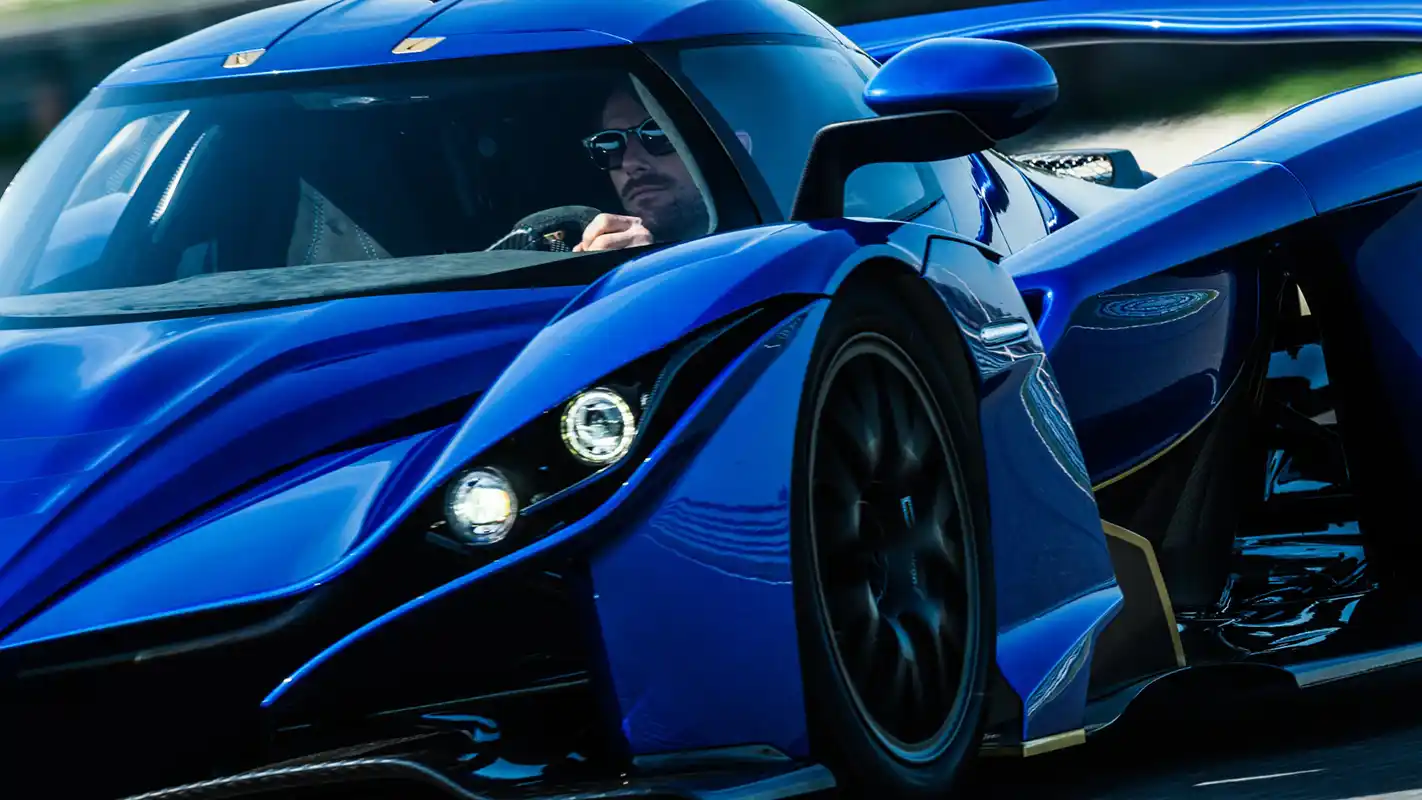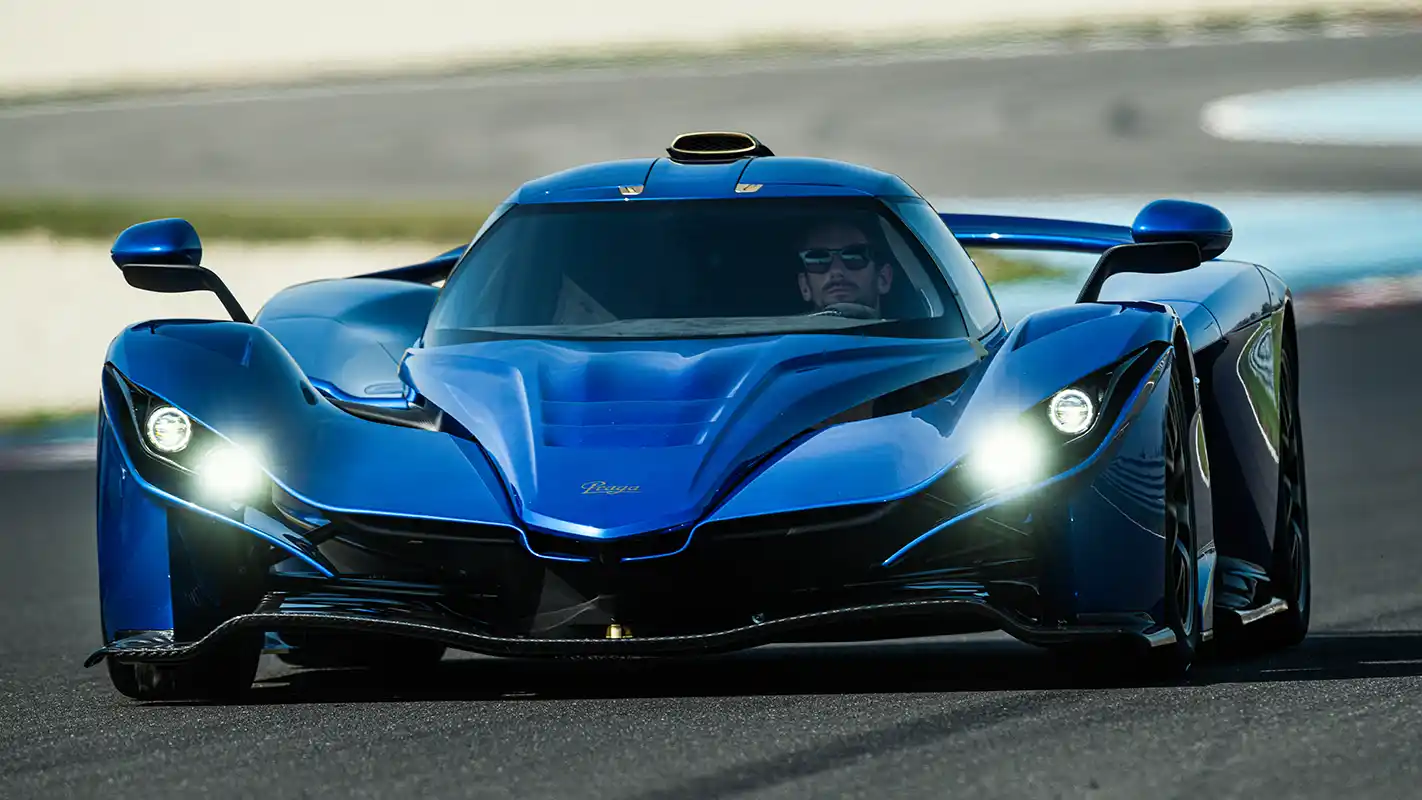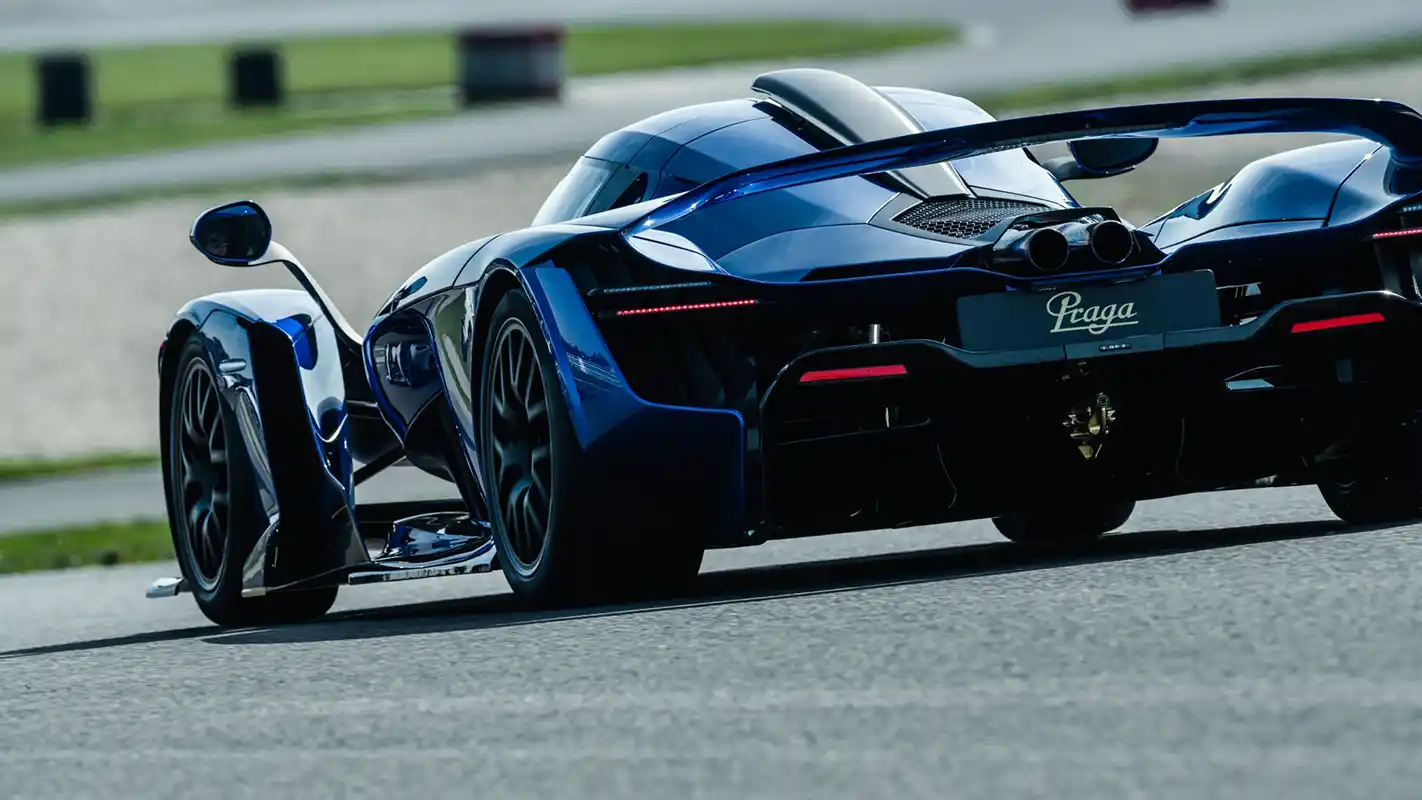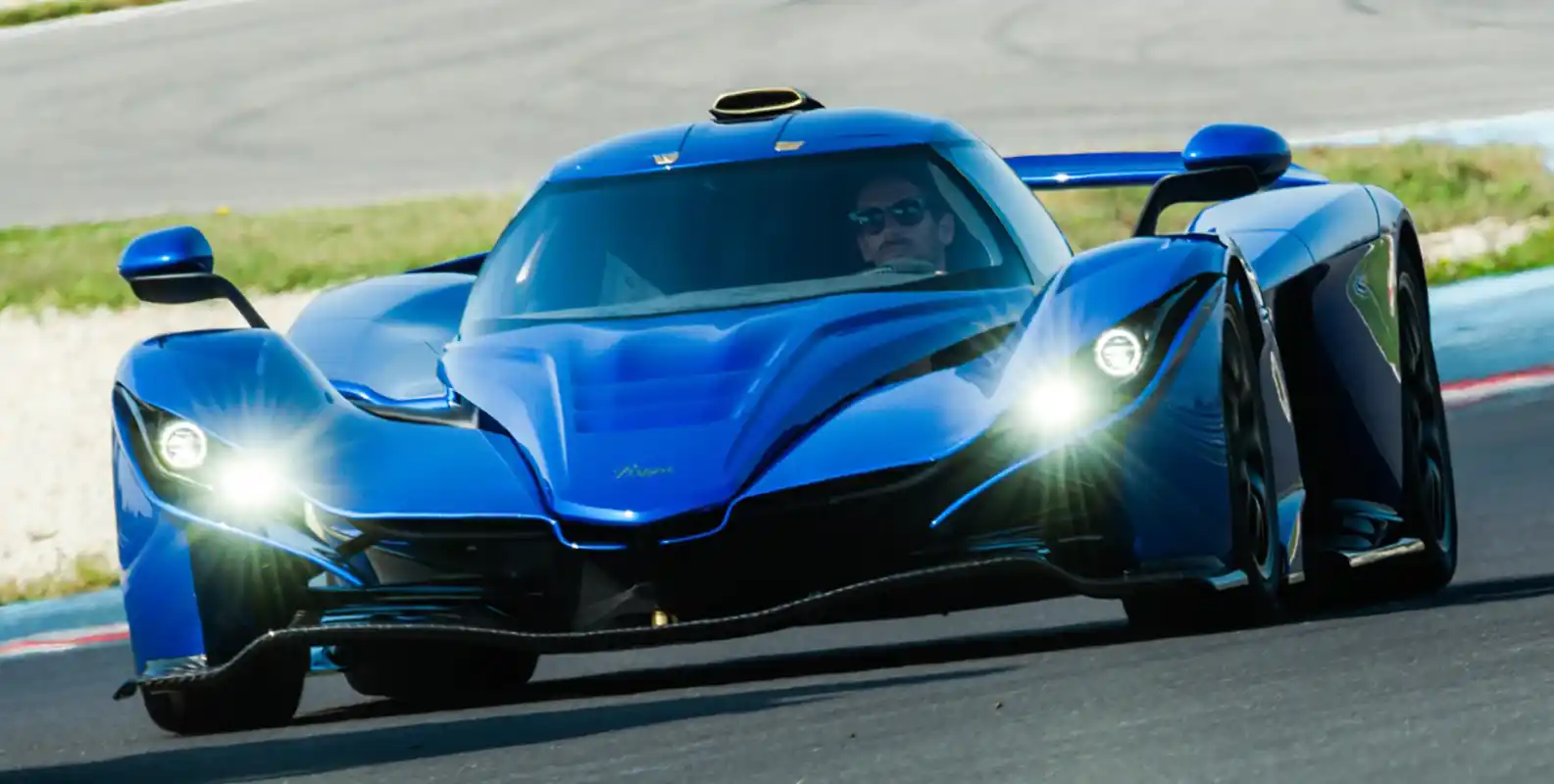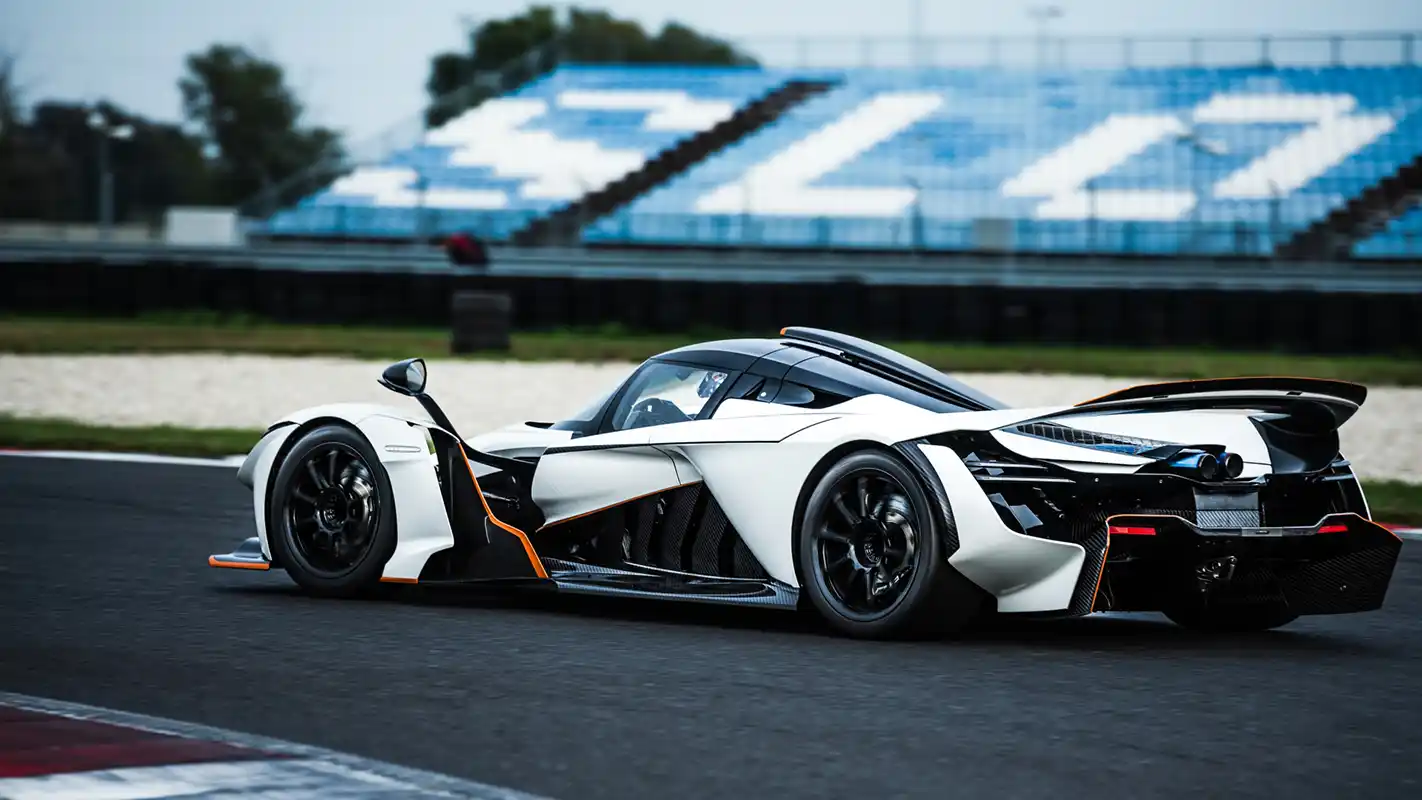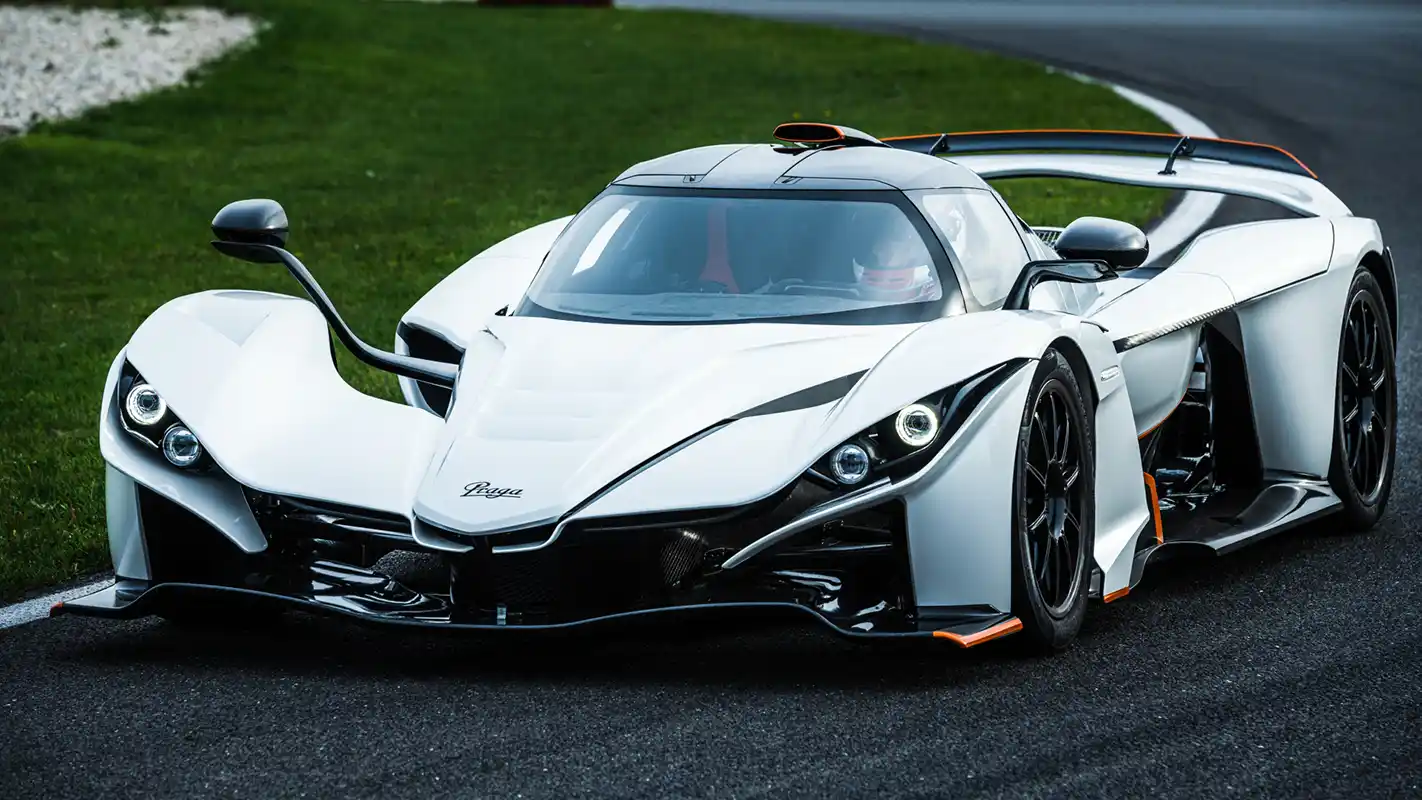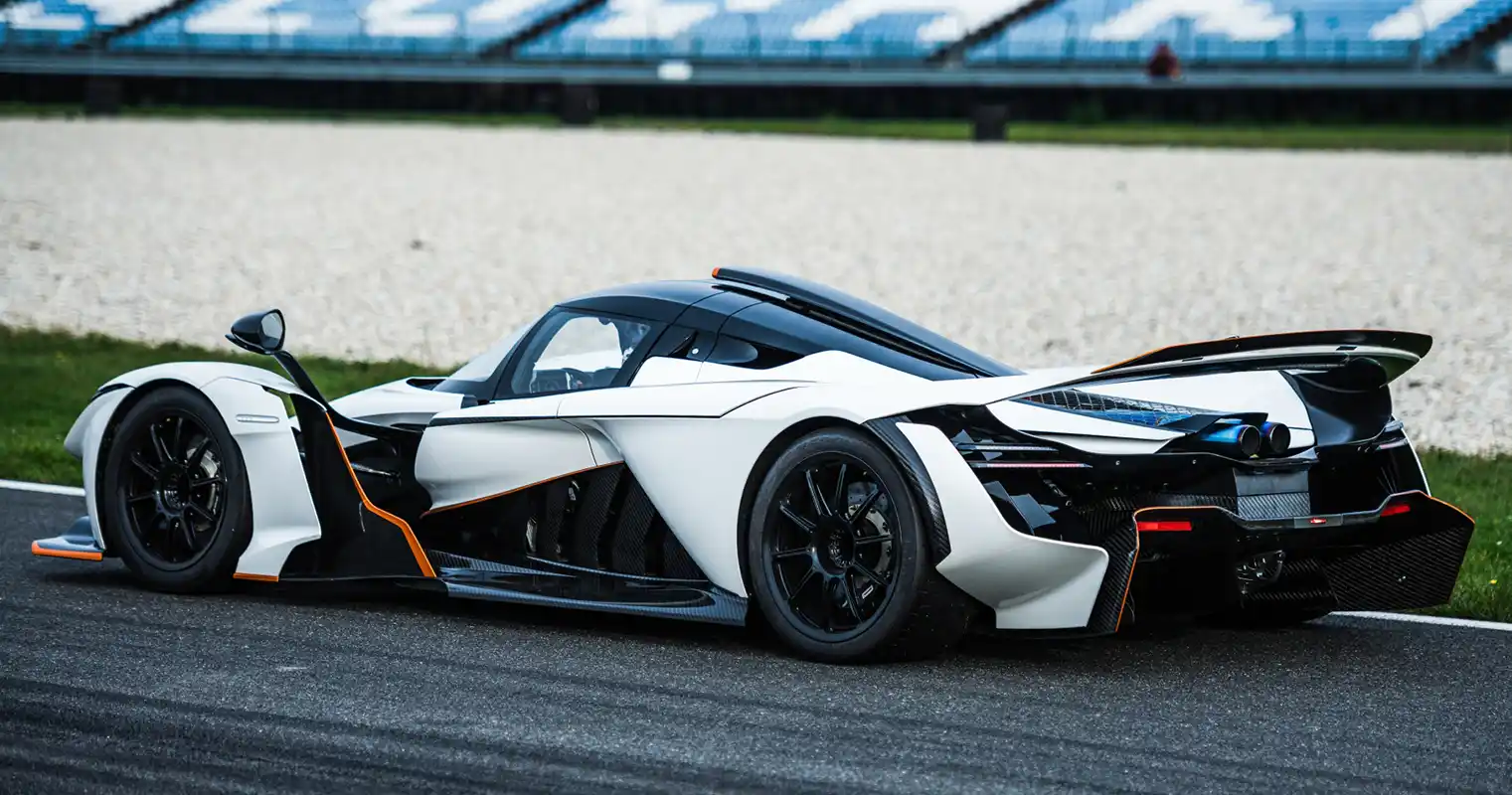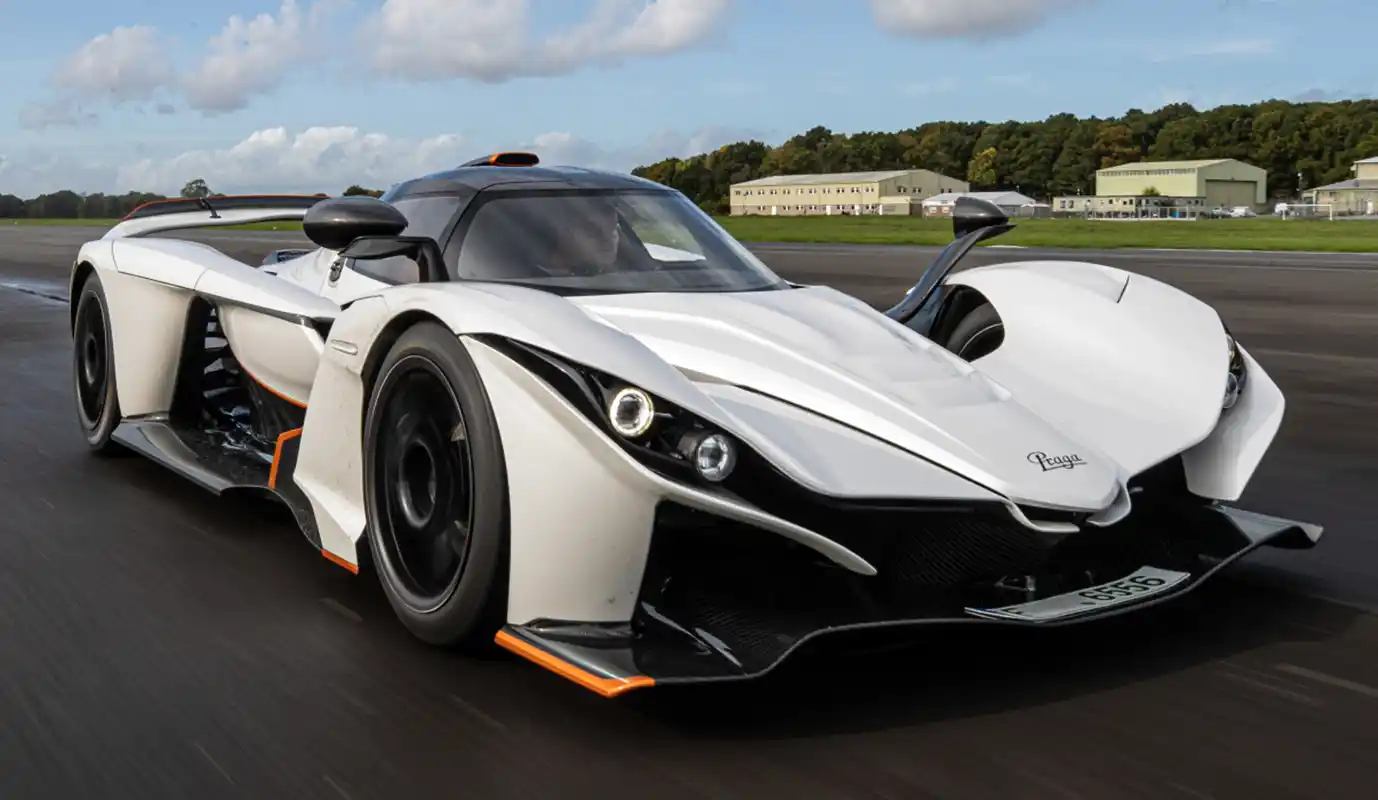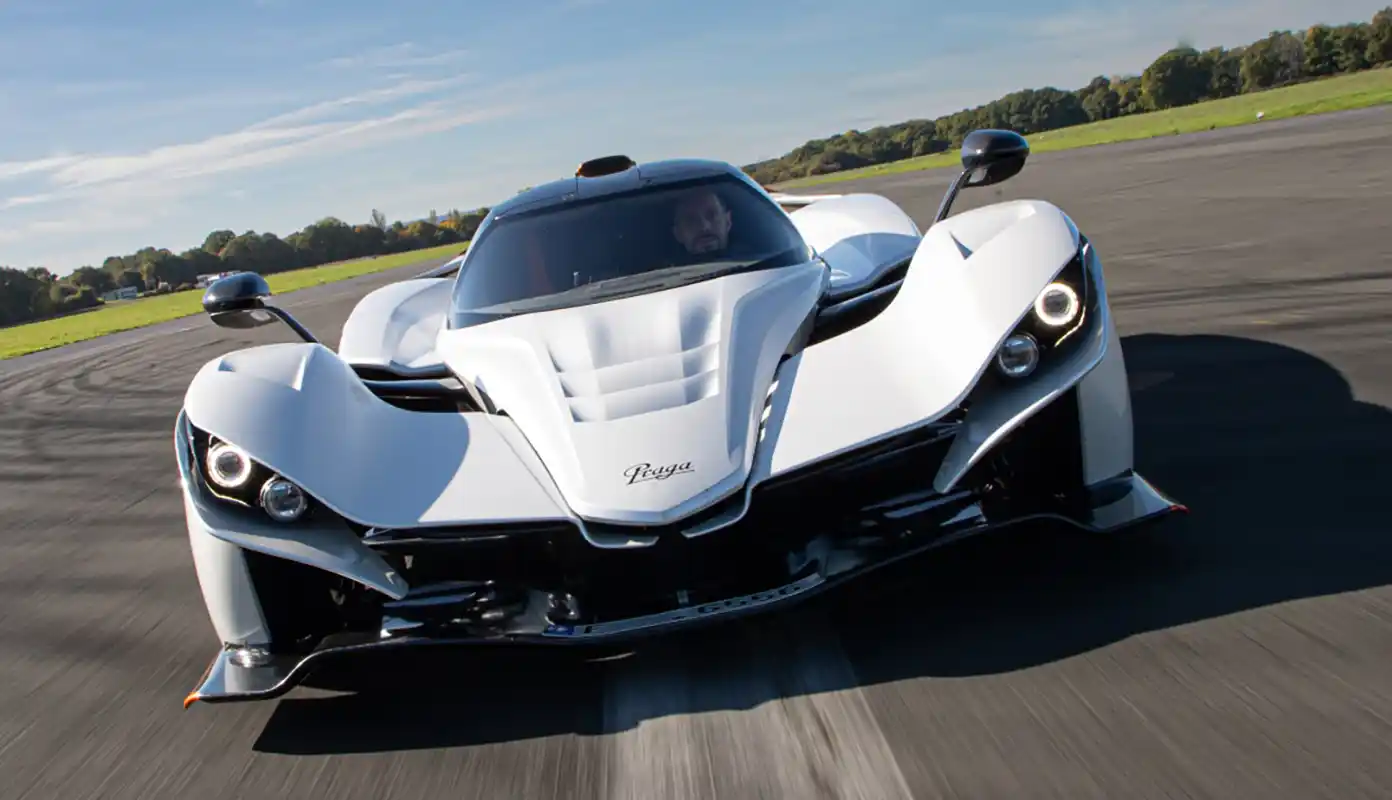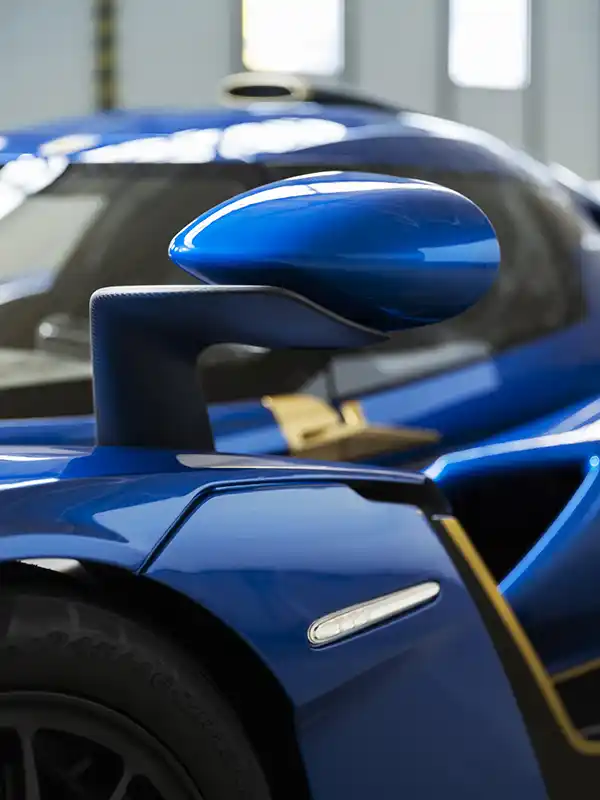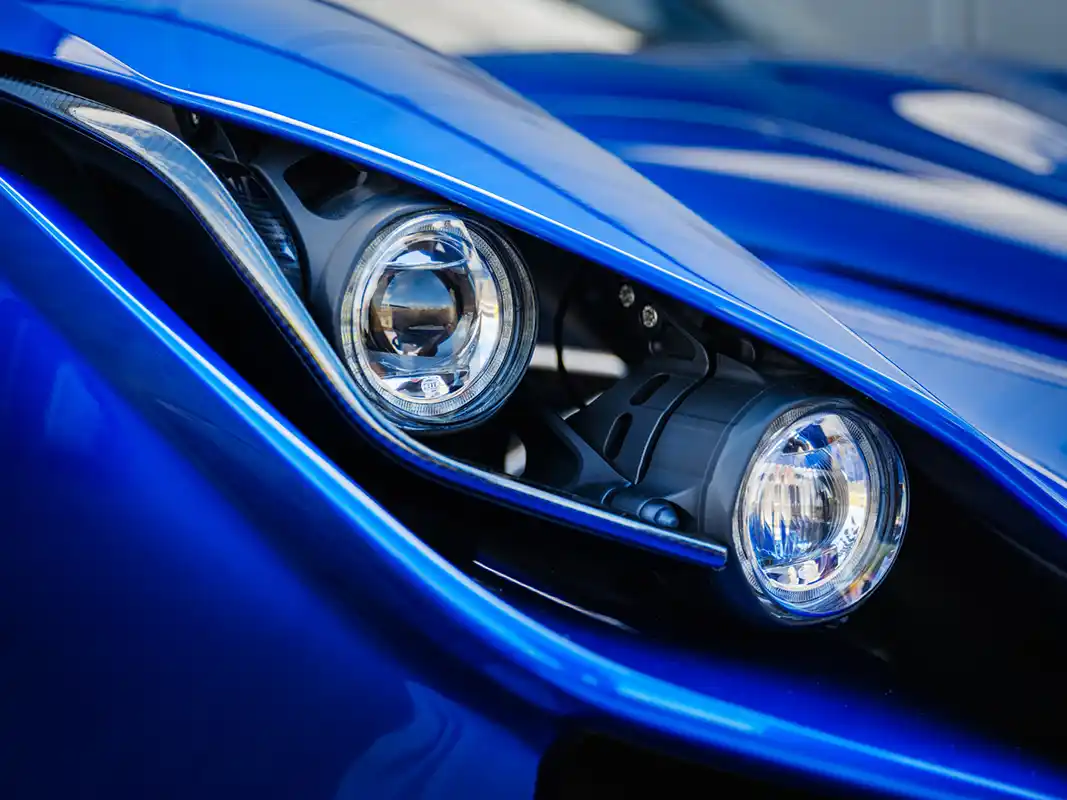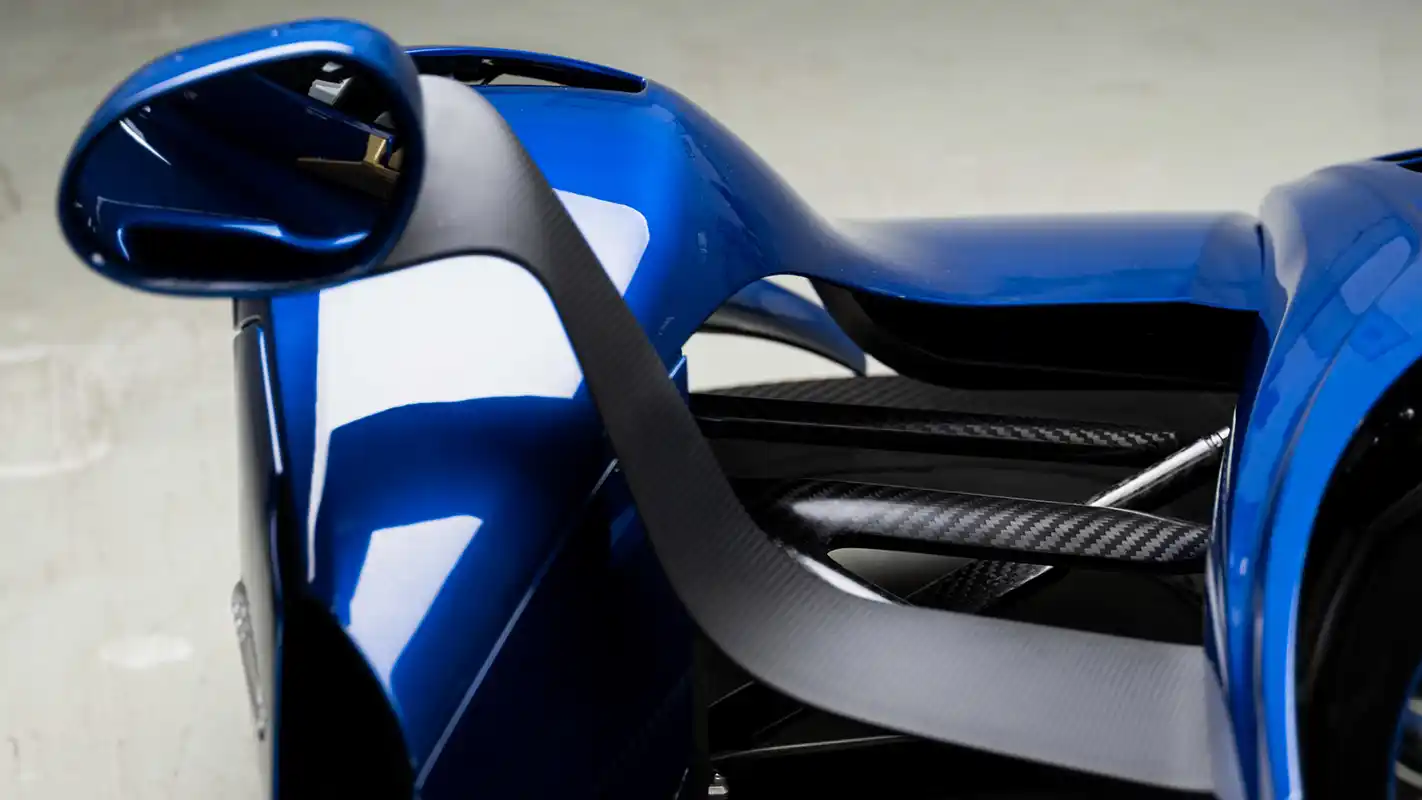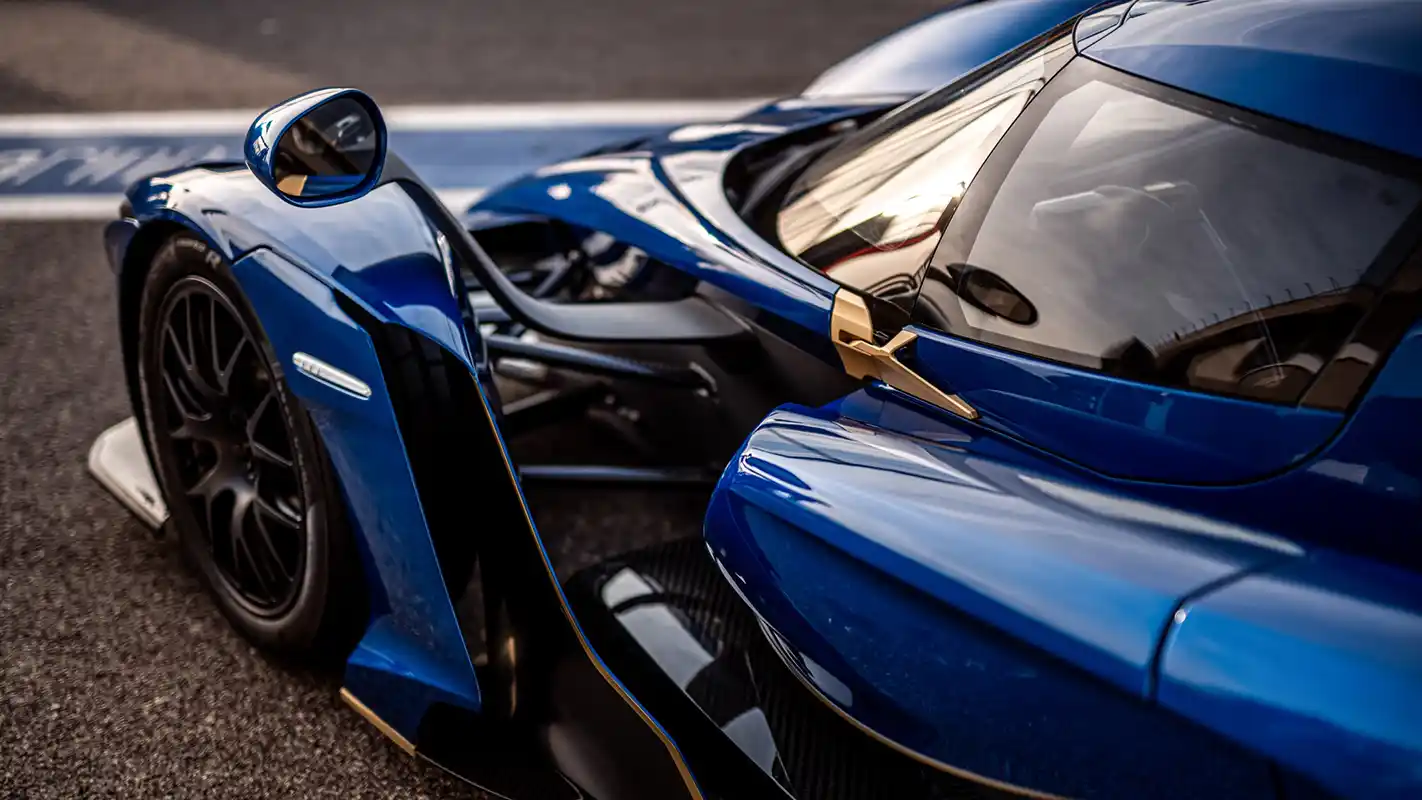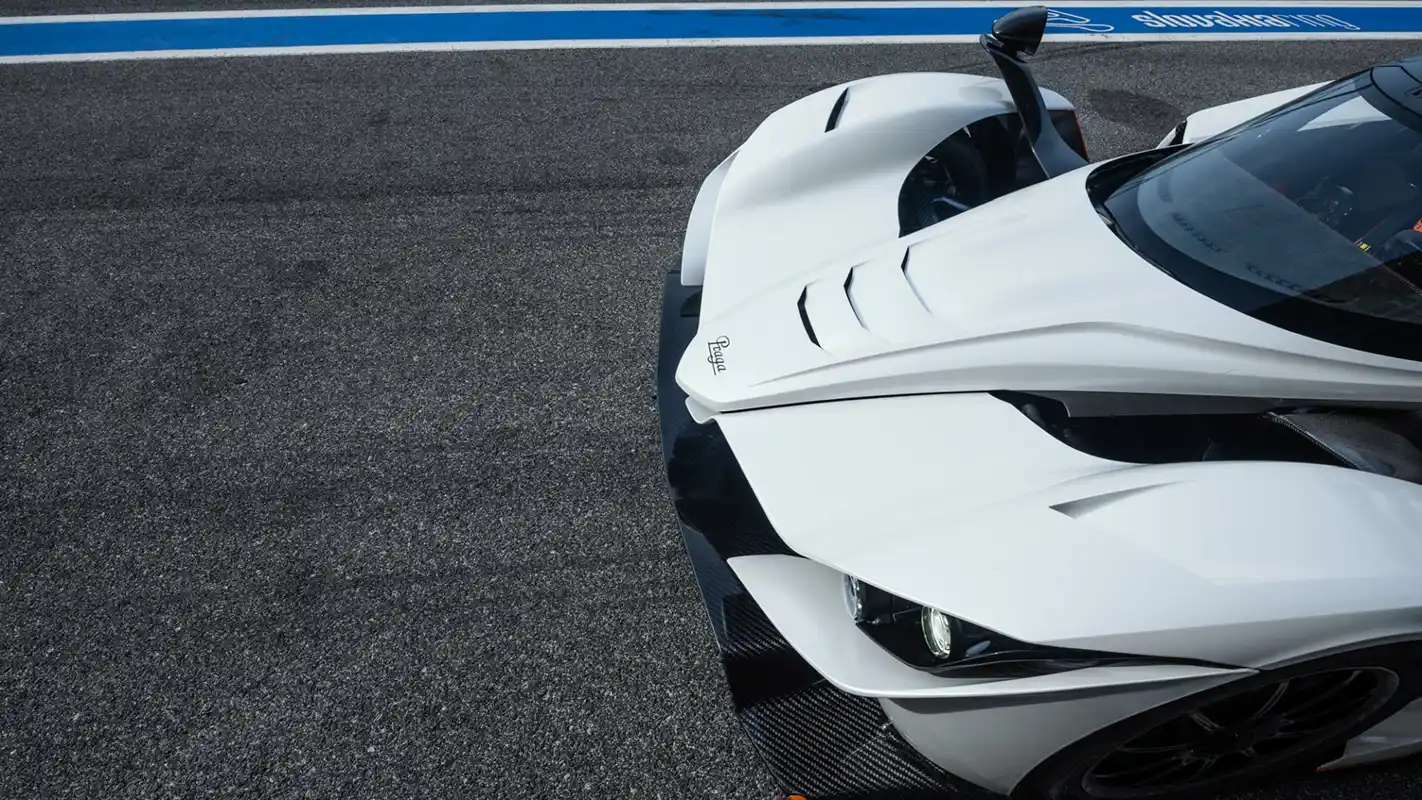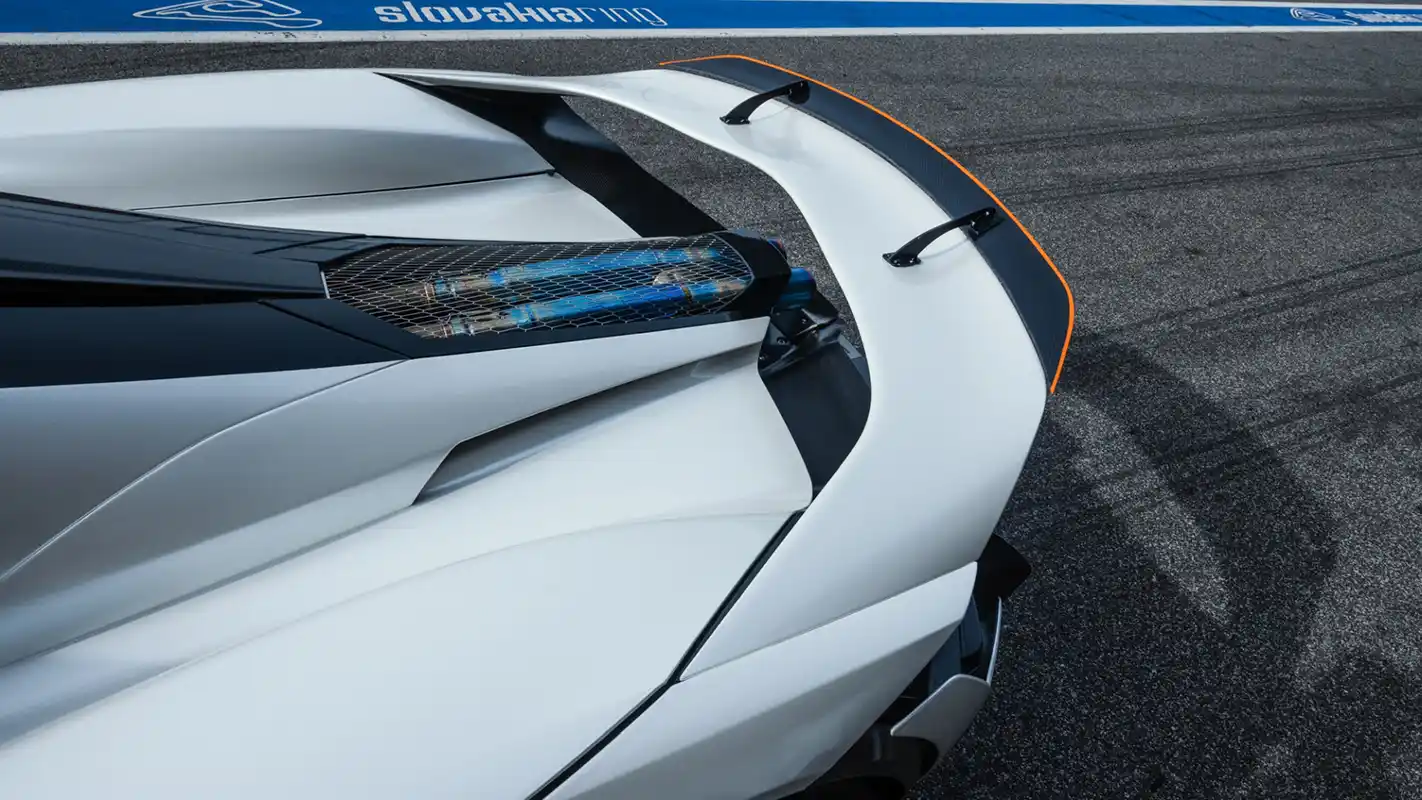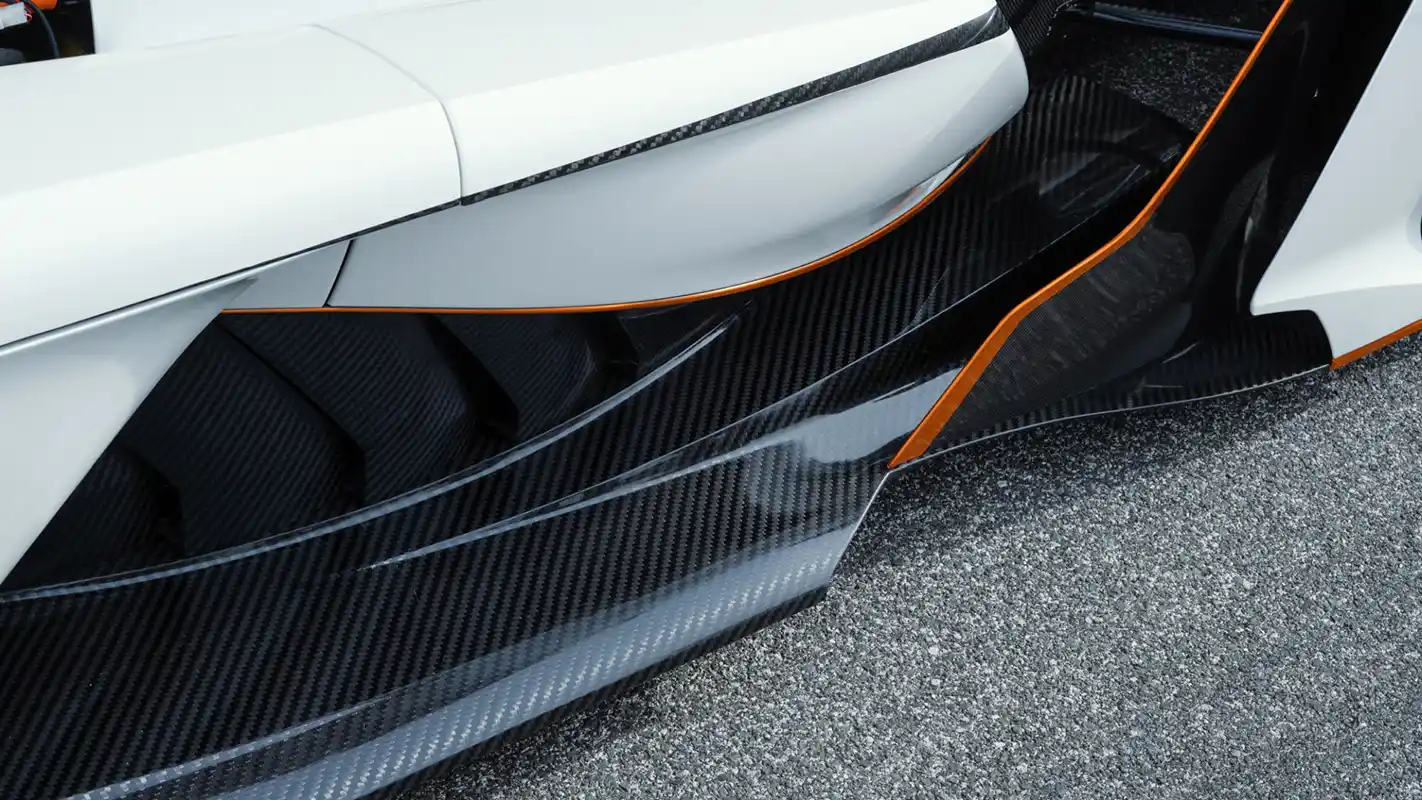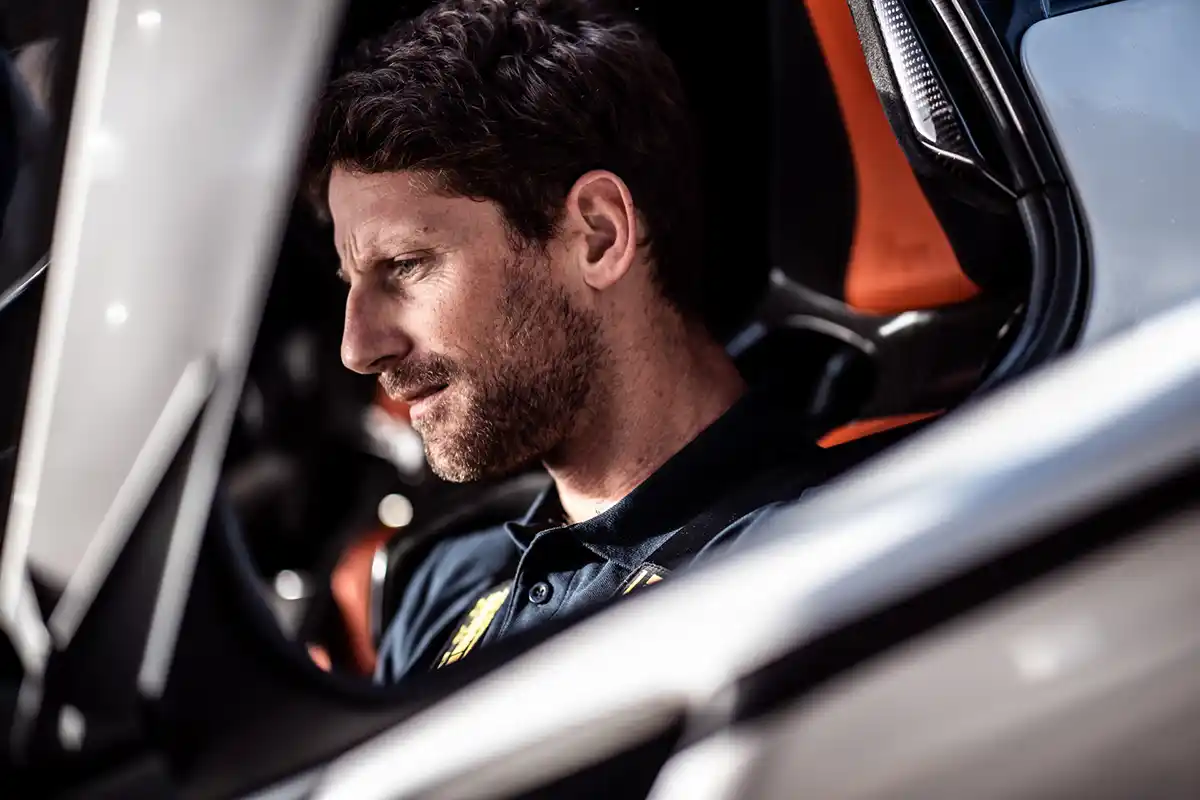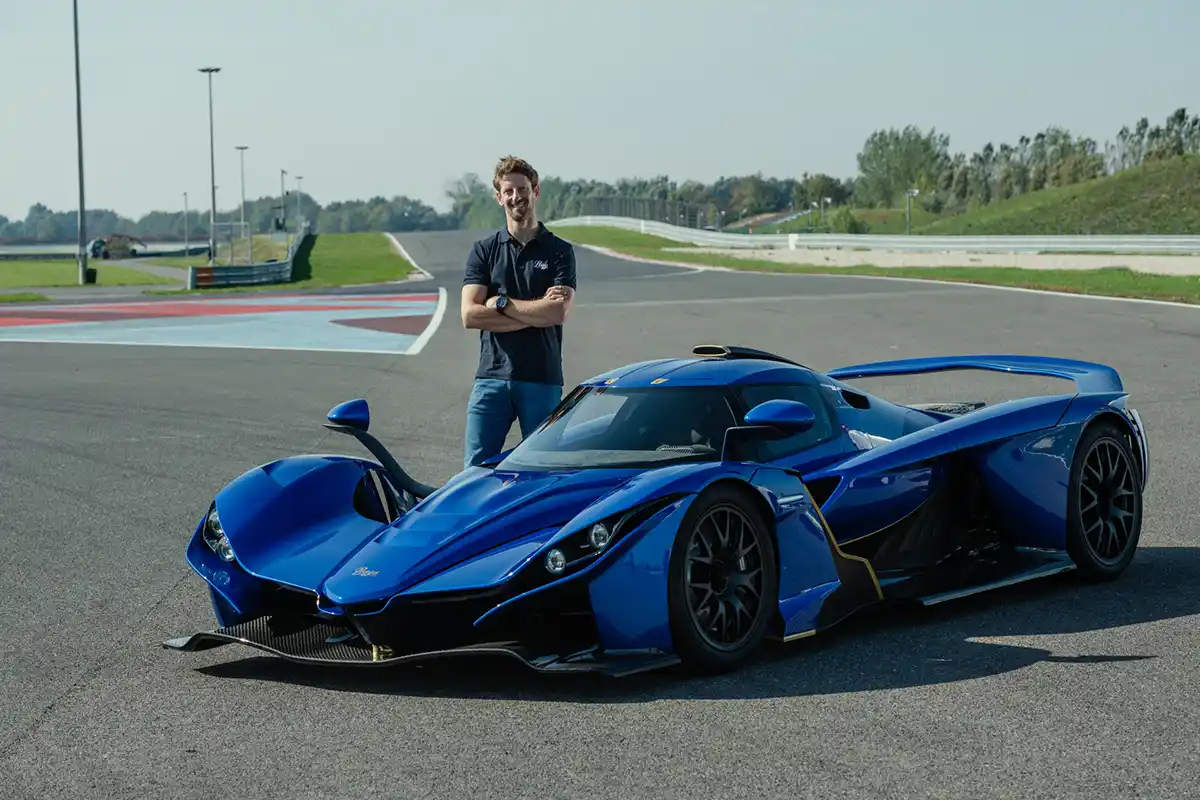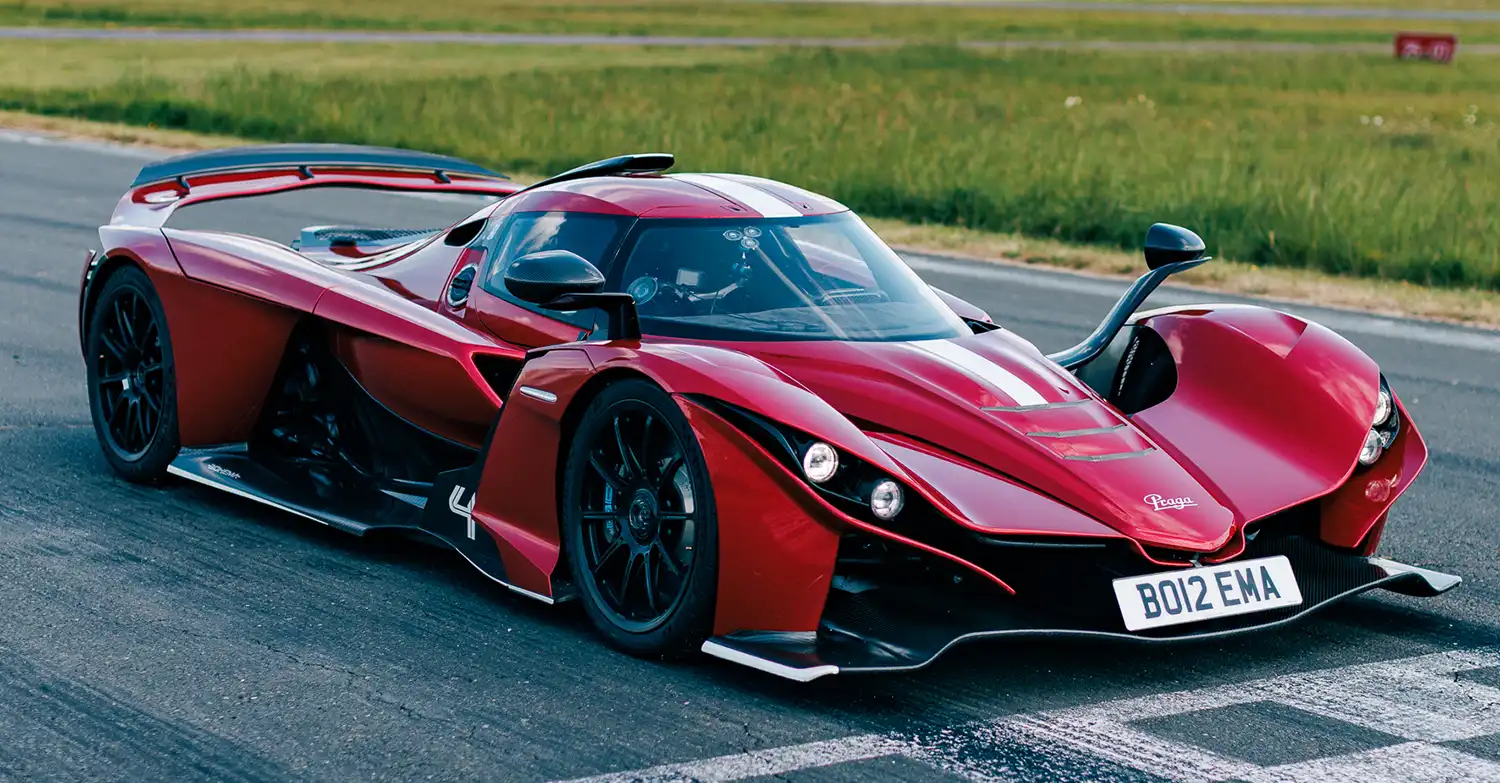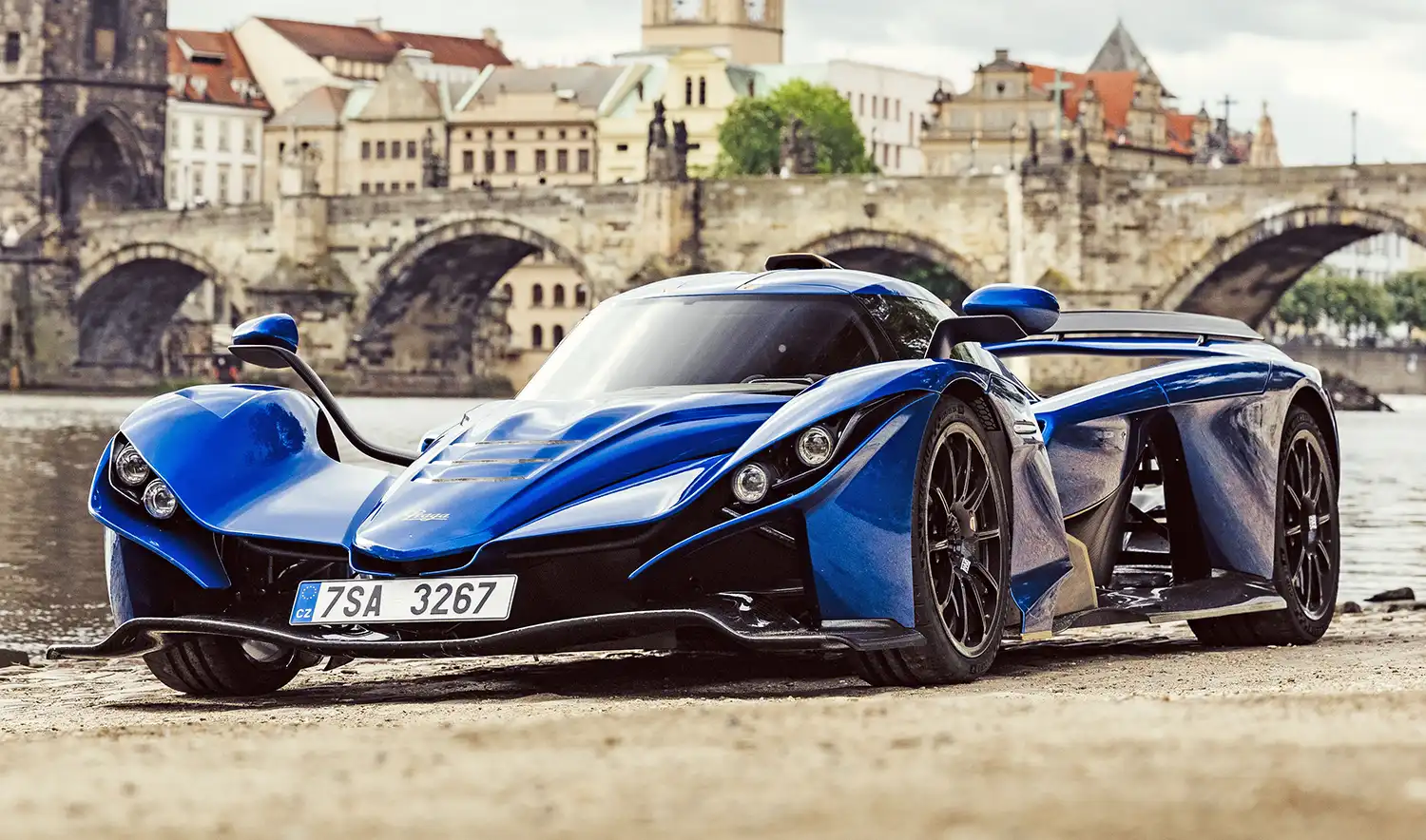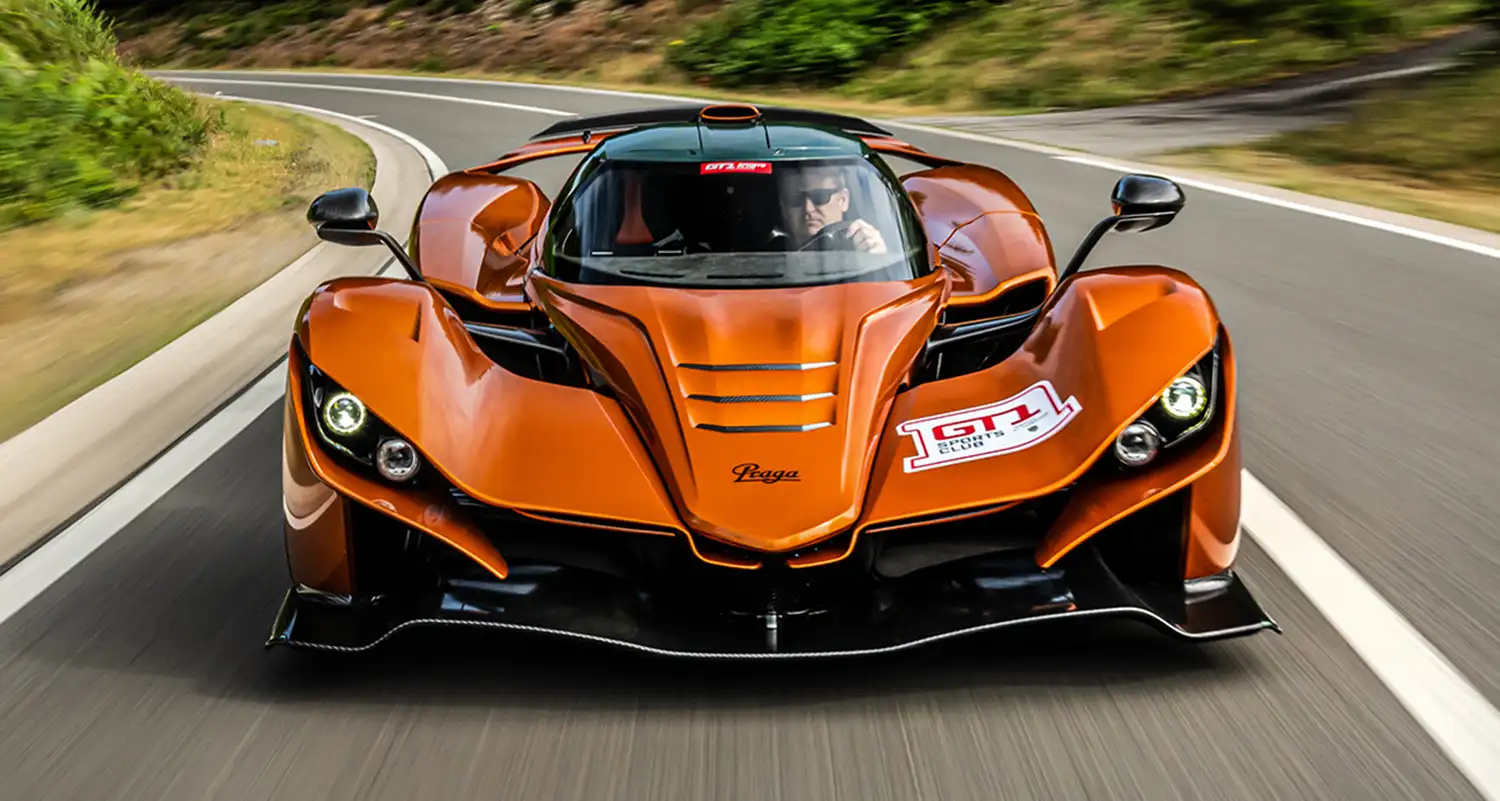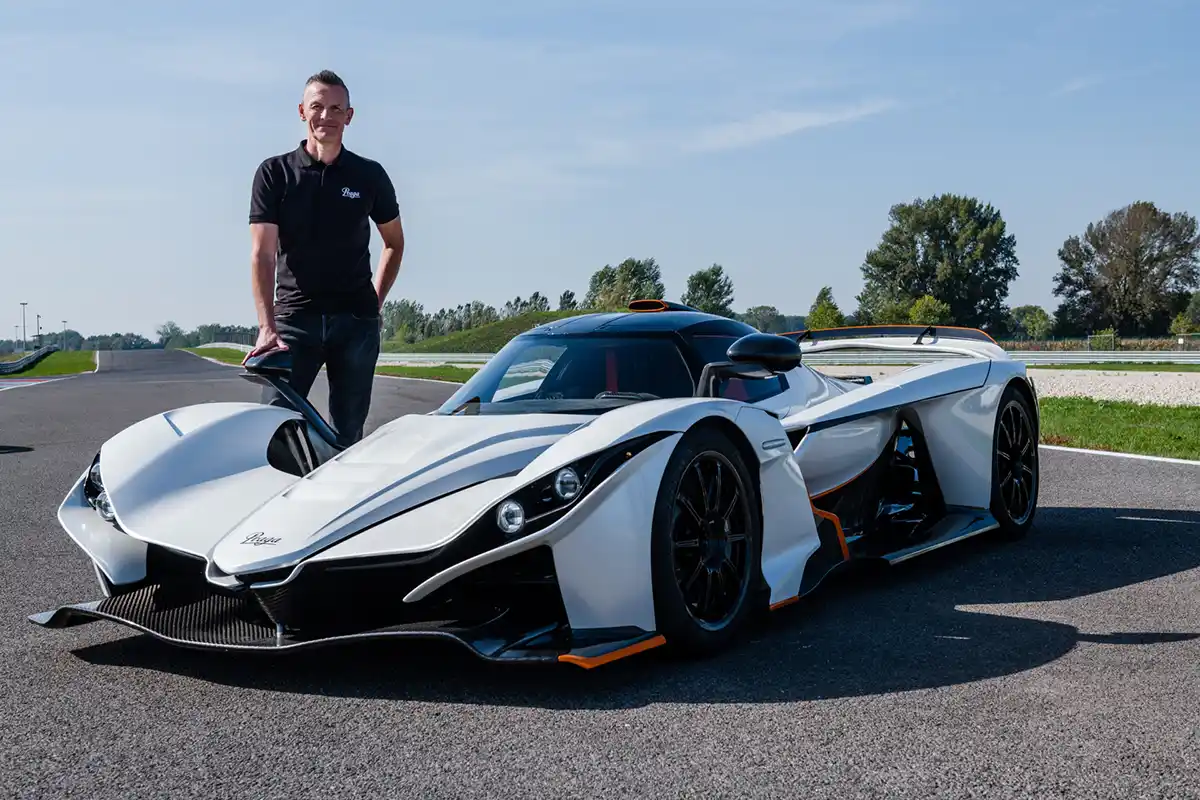
Overview
The historic automotive company Praga, currently a global player in various on- and off-track racing disciplines around the world, has revealed its all-new road legal hypercar in pre-production prototype form: a high-performance, low-volume, beautifully-appointed car designed around three core principles – lightweight, carbon, petrol.
The new Praga Bohema is a sub-1,000 kilogrammes, mid-engined two-seater that, in the right hands, is capable of extreme high performance on track targeting GT3 race car lap times on its semi-slick Pirellis. Yet it is also comfortable and practical for head-turning road trips.
With its carbon fibre monocoque and race-oriented fully adjustable suspension, it is extremely light, targeting just 982 kgs (wet without fuel), while its powerful Nissan GT-R-derived six-cylinder twin-turbo engine ensures reliability, ease of servicing and the potential for further performance tuning. Whilst the Bohema’s race-derived semi-automatic transmission will support a unique on-road experience with track-focused performance.
The goal? That the Bohema is a uniquely styled, rare and exclusive car that you really can drive to the track, pull on a crash helmet (taken from the bespoke luggage fitted in each of the car’s innovative 50-litre side pods), put in lap after lap at high speed on its Pirelli Trofeo R tyres, and then drive home again.
The inspiration? Longstanding Praga friend and ambassador, and former F1 and current IndyCar driver, Romain Grosjean challenged Praga to deliver a genuine uncompromised two-person road/track performance car, promising a truly unique driver experience.
He was subsequently involved in the Bohema project and highlighted the car’s seamless transition from road to track whilst delivering extensive sessions on the challenging six-kilometre Slovakia Ring circuit in recent testing.
“I was astonished by the Bohema’s amazing performance on track, its accessibility on road, and the ease of transition between the two,” said Romain. “Praga has truly delivered on my challenge! On the road, you get a smooth ride, the car eliminates the bumps, you can chat with the passenger, and everything is calm and OK. Then simply switch focus and you are on the track. The same clothes, the same car, but the feeling changes and you are pushing the limit and collecting amazing lap times again and again, discovering unbelievable possibilities in the Bohema. And we still have a few months to fine-tune the on-road compliance and on-track lap times!”
The result? The Bohema is an all-new design, developed by Praga’s small, but talented team of engineers and designers, and perfected in an F1 team’s wind tunnel. It uses a race-derived carbon fibre monocoque, with extensive aero providing over 900 kgs of downforce at 250 km/h. Top speed is just over 300 km/h: the fastest speed achievable on virtually any racetrack.
Crucially, the car’s aerodynamically-inspired engineering has not eliminated elegant and intriguing designed bodywork to ensure the car looks fast, and looks good. High quality machined Praga Gold painted duraluminium details include door hinges and a tow hook featuring an integrated rear-facing camera that stand out on the Praga blue show car and reflect Praga’s attention to detail. The Bohema is that rarest of cars with the ‘wow’ factor in both looks and performance.
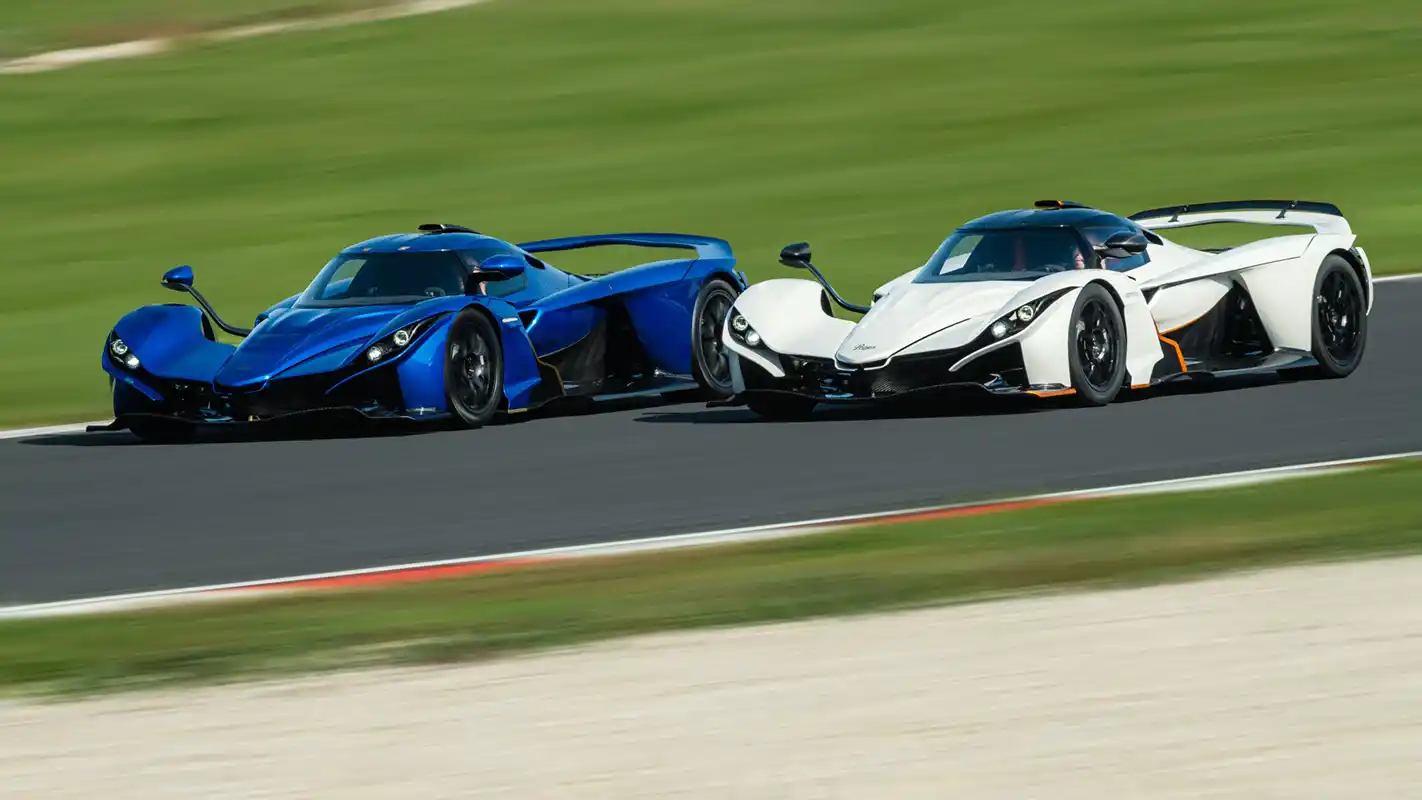
Unlike many racetrack-derived performance cars, the Bohema’s ingenious interior ergonomics delivers a narrow, aerodynamically honed cockpit yet seats two, two-metre-tall adults with fully adjustable driver’s seat, steering wheel and pedals, generous luggage space, aircon and useful rear visibility. All at less than 1,000 kgs.
Praga’s obsession with its sub-tonne target weight is highlighted by the Bohema’s cockpit statistics: structurally designed with 56 individual carbon parts, and trimmed with high-quality Alcantara and leather, the cockpit’s target weight is just 34 kgs.
The focus on keeping the Bohema under 1,000 kgs is demonstrated by Praga’s remarkable attention to detail in every aspect of the design, with extensive use made of carbon fibre, magnesium alloys and titanium.
Its independent suspension uses pushrod-operated adjustable dampers mounted horizontally for maximum travel while minimising bodywork height. In such a lightweight car, with just 180 kgs of unsprung mass, Praga’s development engineers have still been able to keep the suspension supple enough for road use without having to resort to expensive adaptive suspension systems.
The central-locked wheels are 18in diameter at the front and 19in at the rear to offer on-road compliance through their large tyre walls, but the Bohema will accept 18in wheels all-round, which ensures compatibility with the FIA GT3 spec tyre dimension – the race tyre with the widest possible range of competition tyres globally. The powerful brakes use lightweight but durable 380 mm carbon ceramic discs with six-piston calipers.
The Praga Bohema is entering the final few months of development with road and track programmes planned in the UK, Europe and Middle East and at the Slovakia Ring home circuit. Production of the €1.28m / £1.1m (+ taxes) hypercar is scheduled to begin in the Czech Republic in the second half of 2023, with just 10 cars initially scheduled for 2023 production. A global client visitor and spec’ing headquarters will also be established in England in 2023, building on Praga’s growing race programme in the UK.
Approximately 20 cars per year will be hand-built over the following four years ensuring exclusivity for owners, and Praga plans to offer track handover programmes with its experienced test-driver line-up for owners to ensure that the full performance and capabilities of the Bohema are understood and accessible.
Praga Bohema in detail
Powertrain
The Praga Bohema’s PL38DETT is based on Nissan’s famed 3.8-litre, twin-turbo V6 engine used in all its GT-R models since 2007. Initially drawing on Nissan’s experience at Le Mans, it is constructed around an aluminium alloy cylinder block, and there are double overhead camshafts per cylinder bank, with a continuously variable valve timing system on the inlet valves.
The beauty of this engine is not just its sheer performance potential, but also its renowned reliability and tunability.
Uniquely, Nissan supplies brand new GT-R engines to Praga for the Bohema. Engine development and servicing requirements then sees Praga working with the UK’s renowned Litchfield Engineering; another long-time friend of the Praga brand. Litchfield has more than two decades of tuning experience and is known as the global authority on GT-R engines. Litchfield strips the new engines and converts them to dry sump, which reduces the overall height of the unit by 140 mm. This allows the engine to sit lower in the Bohema and prevents the risks of oil surge under high-speed cornering loads.
Litchfield also makes a number of modifications for increased reliability and power, including swapping to new twin turbos. In this base-Litchfield specification, Praga is targeting the Bohema production car to deliver up to 700 bhp at 6,800 rpm and 725 Nm of torque from 3,000 to 6,000 rpm, but Litchfield is known for building 1000 bhp-plus engines from the GT-R unit.
The engine breathes out through exhausts that are titanium right from the turbos to the tailpipes, with much of the silencing provided by the catalytic convertors, giving a sharp crackle to the engine note while remaining within typical circuit noise limits – and ensuring that occupants can still hold a conversation even at well over legal road speed limits.
The Bohema’s engine is mated to the renowned Hewland sequential gearbox through a robotic clutch allowing for semi-automatic drive mode. This choice of gearbox, equipped with bespoke road-optimised helical cut gears, ensures fast-changing, durability and ability to handle high torque at a minimum weight.
In classic race car and supercar style, the engine sits directly behind the cockpit, with the transmission behind the engine driving the rear wheels, for optimal weight balance and responsiveness in turns. Crucially, the engine and gearbox are independently mounted from the carbon chassis ensuring annoying and loud sub-woofer style resonance and vibrations are not transferred through to the cockpit from the engine bay. A 74-litre fuel tank ensures road trips can be completed with minimal fuss.
Chassis and bodywork
The Bohema has been designed and styled completely in-house by the Praga team, using CFD (computational fluid dynamics) modelling followed by fine-tuning in an F1 team’s wind tunnel. Engineers and designers have worked as one, to ensure all surfaces look exciting and elegant yet remain uncompromised in their contribution to aerodynamic efficiency and performance. It is undiluted form and function in harmony.
It uses extensive and innovative aerodynamics, including a unique rear spoiler design which, combined, results in over 900 kgs of downforce at 250 km/h.
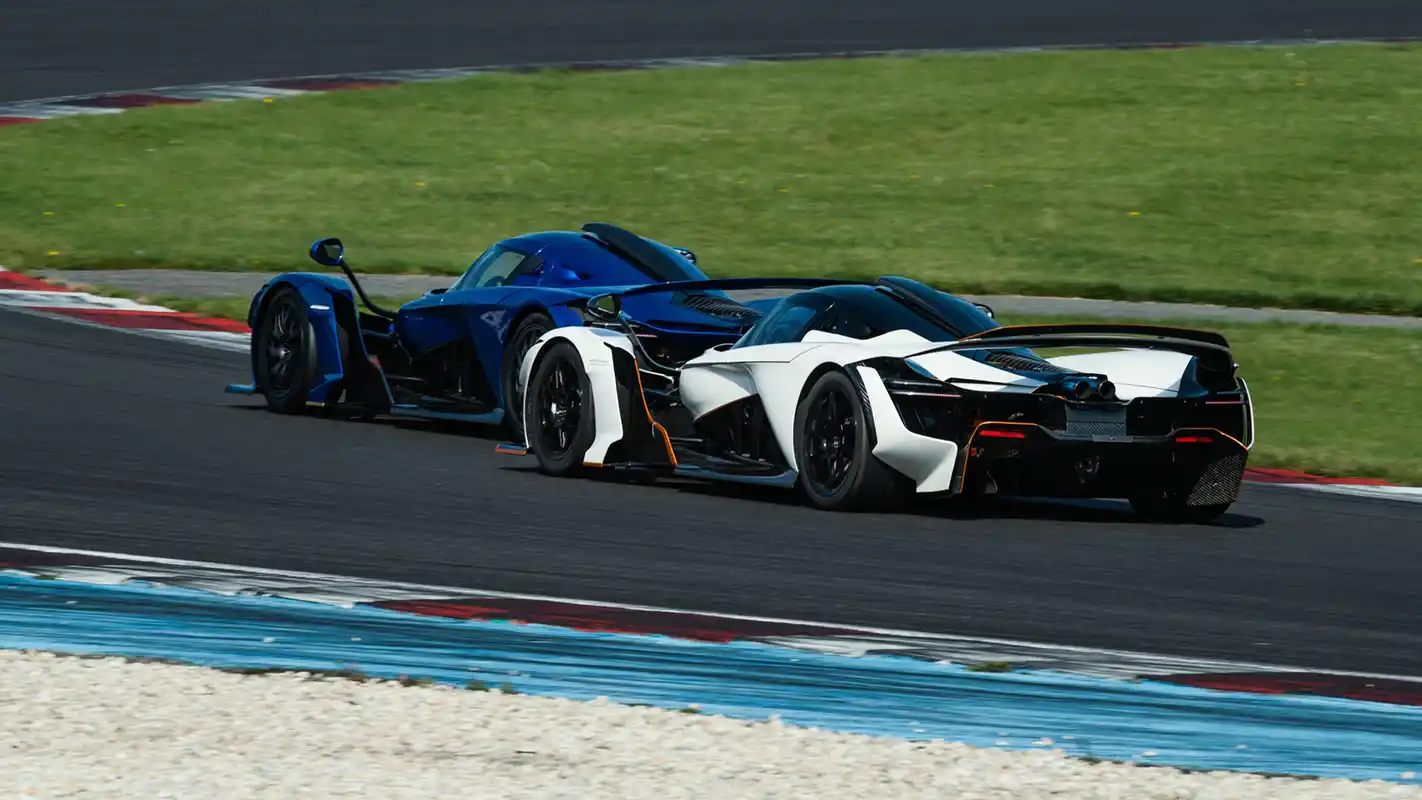
The chassis is an extremely strong, torsionally rigid carbon fibre monocoque construction: in modern times, Praga has only ever designed and built all-carbon race cars, benefitting from the experience and local expertise in carbon fibre manufacturing in the Czech Republic and Slovakia employed by many of Europe’s leading luxury car brands.
The lightweight carbon fibre outer panels are attached to the monocoque. The front top panel covers the suspension, with subtle bulges to accommodate the horizontal dampers. At the rear, a single panel covers the engine, transmission and suspension. The front wings are not structural, so the front mirrors are mounted on long rigid stalks to provide stylish and aerodynamic structures with excellent rear vision without vibration or obstruction.
Within the aerodynamically styled rear wheel arches there are deep storage areas, for which custom-fit leather luggage is available – big enough for a crash helmet, racing suit and boots, or a casual weekend bag. The doors are front hinged and electronically released, with back-up mechanical releases.
The deeply curved trademark Praga windscreen ensures remarkable visibility inside the cockpit, and is swept clean by an ingenious mechanism specially developed by Praga to ensure that the windscreen wiper stays in contact with the glass across its full width.
Cockpit
With the race-derived carbon fibre monocoque, the cockpit is necessarily narrow but cleverly shaped to perfectly fit two large adults in race-position comfort. The doors swing open giving access over the bodywork into the cockpit, with steps built into the footwells to allow driver and passenger to lower themselves into their seats without having to step onto the seats themselves. Furthermore, the steering wheel is removable to aid entry and exit.
The driving position can be perfectly tailored with adjustable steering column, pedal box, and seat position and angle. The ergonomically sculpted structure also incorporates moulded recesses for the passenger’s arms and elbows to ensure comfort without infringing on the driver’s space – a great deal of effort has been made to ensure a perfect driver’s environment.
The removable steering wheel in itself is a work of art. It incorporates a large digital display, showing speed, gear selected, oil and coolant temperatures, driving mode and warning lights. To either side is a switchgear for indicators, horn and further functions, plus rotary thumbwheel selectors. The rim is beautifully trimmed in Alcantara and the central pad is covered in leather with an embossed Praga logo. The grip and paddles’ size and positioning have been designed perfectly to offer steering and shift control comfortably for small and large-handed drivers alike.
Just to the side of the steering wheel, in the slim centre console, are further controls including launch control, in-built fire extinguisher trigger and the electronic parking brake. To either side of the cockpit are the electronic door releases (supplemented by mechanical releases in the roof) plus mirror controls, while the aircon controls are mounted in a stylish ‘fighter jet’ style roof console: Praga’s design team taking inspiration from the company’s aviation and race car divisions.
An ingenious and hidden sprung-mount bracket above the centre console allows a smart phone to be securely mounted for use as a satnav and performance data monitor. There are storage pockets in the doors and behind the seats to ensure bottles and oddments can be safely stashed out of the way.
While everything in the cockpit is designed to contribute to the car’s low weight target and functionality, the aesthetics and attention to detail have not been overlooked – the beautifully machined thumbwheels and air vents, the finishing of the interior carbon fibre and the exquisite hand stitching of the Alcantara are perfect examples.
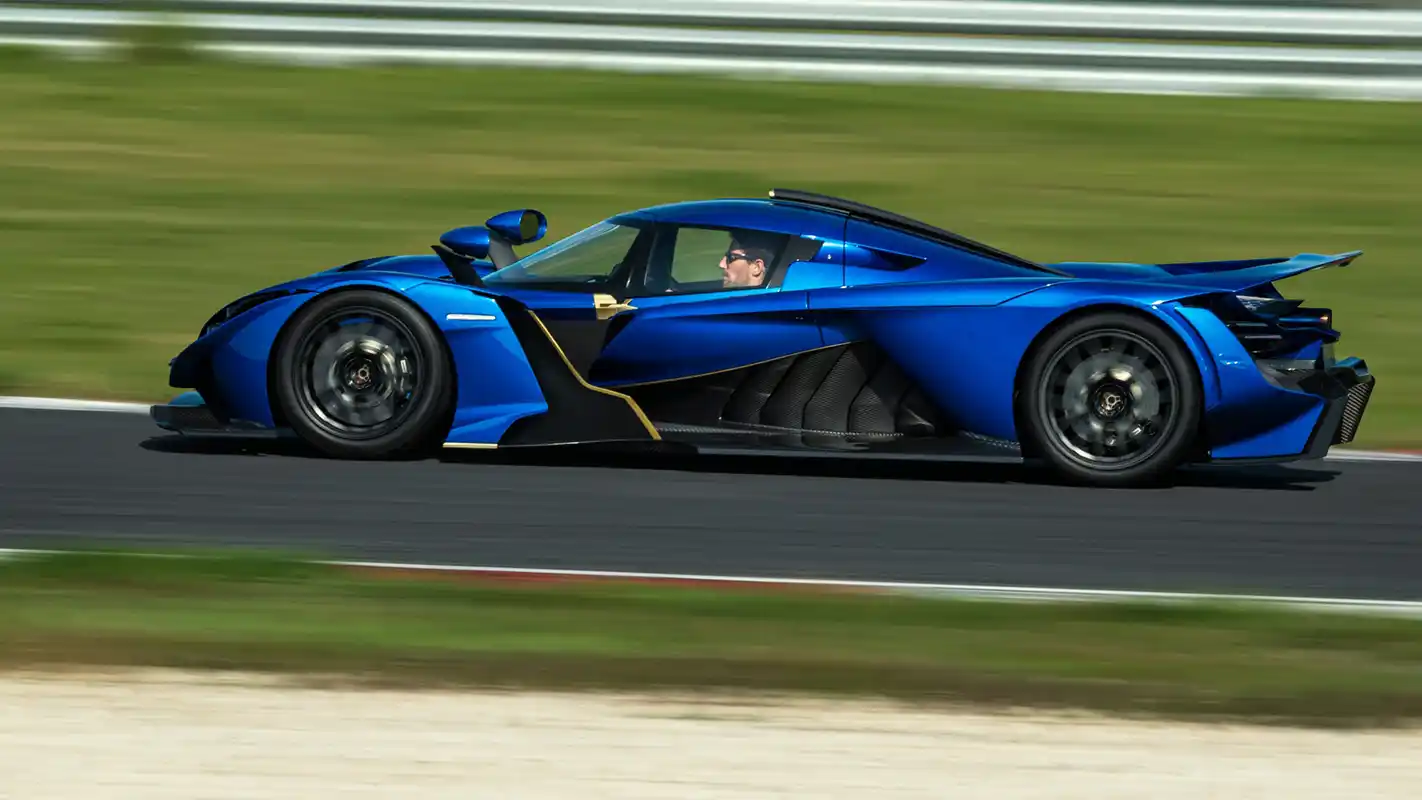
Market
Five years since project planning, and testing on track and road began, the Praga Bohema is currently undergoing its final development programme in the UK, Europe and Middle East and will be presented in its final production specification in the first half of 2023. Praga is targeting making the Bohema available as road-legal in all major hypercar markets and is now taking orders and in discussion with potential sales and aftersales partners in countries including Australia, Germany, Hong Kong, Japan, South Africa, Spain, Taiwan, UAE, UK and USA.
Praga Cars UK will manage the Bohema’s global brand hub from a new headquarters in England, providing clients with hospitality, test drive and spec’ing facilities. In recent weeks the Bohema development team has undertaken a test programme from the Dunsfold test track made famous by Top Gear TV. Dry and wet sessions have focused on fine-tuning on-the-limit rear aerodynamics and on-road comfort in the UK, where full road-legal compliance was recently secured. Praga R1 racer and professional test driver Ben Collins – the most famous Top Gear Stig of all – added his Dunsfold expertise in recent weeks and hopes to re-visit with the final production-spec Bohema in 2023.
Praga plans to hand-build around 20 cars per year, focusing on quality and attention-to-detail over its four-to-five-year production programme: but a maximum of just 10 cars will be produced in 2023 ensuring the first Bohema owners are provided with a car and service of superb quality.
Assembly
Praga has a long-standing partnership with Kresta Racing, the Czech Republic’s most highly respected rally team, where its spotless assembly facility will hand-build each Bohema, beginning in the first half of 2023. The company is known for its high standards of car preparation and assembly and was founded by Czech rally legend Roman Kresta. His historic race victories include the Czech national rally championship on five occasions, whilst also spending a decade in the World Rally Championship, driving for the official Ford and Skoda WRC teams.
Praga in motorsport
Many up-and-coming drivers have cut their teeth in recent years in Praga’s renowned karts, which have been raced worldwide for more than a decade. Up to 7,000 kart chassis are built by Praga every year, making it one of the world’s most successful kart manufacturers, having twice won FIA world championships in the past decade.
In recent years, Praga’s R1 race car has also become a growing force in racing across the UK, Europe and North America. These carbon fibre monocoque, mid-engined race cars are known for their GT3-beating downforce performance and handling, combined with their relatively affordable running costs and ease of maintenance.
As an example of Praga’s successes, in 2020 the R1 scored overall victory in the highly competitive Britcar Endurance series; in 2021, now in its own class within Britcar Endurance, R1s took seven wins out of nine races against far more exotic and expensive-to-run GT3 machinery and prototypes: locking out P1 to P8 in qualifying at Oulton Park a highlight of the season. In 2022 a new one-make Praga Cup UK attracted widespread attention and top-level drivers, whilst R1 race wins have been achieved in Australia, Dubai and the USA.
Praga history
Praga is the biggest and oldest car brand you might not have heard of, but is proud of its rich history. It dates back to the late 1800s as a heavy industrial manufacturer of everything from bridges to steam trains, and it was a significant presence in Central Europe during the first half of the 20th century. It moved into vehicle production in the early 1900s, making its first car in 1907, becoming a major manufacturer of cars, motorcycles, commercial vehicles and aircraft. Praga-built trucks, in particular, dominated the roads in the firm’s native Czechoslovakia.
The company also developed a wide range of passenger cars and motorcycles, especially during the 1930s. These included the stunning BD500 motorbike and the sporting Praga Alfa car, which heroically won the important 1933 1000 Miles of Czechoslovakia road race 89 years ago: inspiring Praga’s plans to make 89 Bohema hypercars for road and track.
Car production declined after World War Two when the new communist government dictated that Praga concentrated on making trucks and transmissions rather than road cars. Skoda, instead, was favoured as the country’s car manufacturer of choice, with Tatra instructed to build luxury cars and trucks.
With the fall of Communism in Czechoslovakia in 1989, Praga – still a major presence around Central Europe – was able to set its own agenda again as a privately owned company. In the mid-1990s, whilst still producing trucks and large-unit gearboxes, Praga introduced a range of motocross motorcycles; followed in the early 2000s with specialist go-anywhere trucks that have most recently achieved strong results in Dakar rallies, and then in 2009 by racing karts. It also works in aviation, with major engine-testing contracts that give its engineers access to the very best aerodynamic expertise. An innovative, STOL Praga airplane is soon to take to the skies from the company’s Praga Avia division.
In 2012 Praga re-entered the race car market with the launch of the R4S then the R1 race cars that today win in one-make, mixed prototype and mixed endurance race series in Australia, Dubai, the UK and USA. The Bohema shares no single part with the R1, but the race car inspired the one-off street-legal R1R prototype – itself providing the catalyst for a more luxurious, higher-performance and visually dramatic two-seat hypercar: the road legal track-focused Praga Bohema.
